#probably not a coincidence that my health insurance is going up too this year
Text
I have never in my life had to pay to see my doctor, a visit to the GP has never cost me a cent, I have always been able to get a Drs note for work, or catch an illness before it got too bad, I've always just been able to go in whenever I needed to without having to worry about being able to afford it
until now
now for the first time in my 28 years of life GP offices are starting to charge people for appointments
what a fucking phenomenal step backwards we have taken in our healthcare system
now I'll have to pay money not only to get my medication, but to even have my script renewed
we were supposed to be moving forward with healthcare, we were supposed to be making advancements, not sliding back down into the fucking capitalism ditch
I was hoping one day I wouldn't have to spend so much money on physiotherapy just to live without pain, I was hoping the healthcare system would fix it's holes in support for ongoing care for chronic conditions
and INSTEAD I am now being told that soon I will have to PAY just to go see my doctor, I got FIVE free physio appointments per year, FIVE, which is a JOKE, and now I have to PAY to have access to those, WHY AM I PAYING MORE MONEY
how can we be going backwards, how???
#lula's life#rant#and yes I know other parts in the world are used to this#I know american healthcare is garbage#and some countries have no healthcare at all#but it is fucking terrifying to have had this and have it slowly whittled away#you all should have this WE all should have this#and I DID have this#if they take this away then what's next?#what are they going to charge us for next???#probably not a coincidence that my health insurance is going up too this year#this is so fucked
68 notes
·
View notes
Text
S5 Ep 15 Pt 1: The Gang Gets Lost in India
Ah, back to Yugioh classic. Sort of. We’re going into the second filler arc before Bakura, which I have been told is kind of nonsense. And youknow what, from the first scene--this is the first scene by the way--yeah I can see the nonsense.

We got Yami cosplaying as the Chrysler building, we got Yugi saying WTFWTF, we got...this thing?

This thing tells us “Join my game, Yugi!” and then the demon just kinda bounces.

K, bye, I guess.
(read more under the cut)
Waking up from this nightmare, Yugi reveals that he has outgrown his good pajamas. Or maybe he just overused them like I did to my favorite pajamas during quarantine (which, not gonna lie, I hand sewed my favorite pajama pants back together 2 or 3 times like they were the Velveteen Rabbit. Quarantine pajamas and me were like best buds for a year there.)
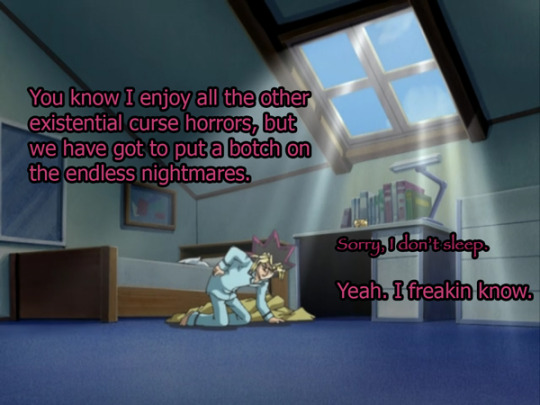
RIP Yugi’s good pajamas.
It’s fine. I’m fine.
I can get used to Yugi in his normal ass old man pajamas without any cute stars on them. I can accept this. He’s getting older. So much older that for a second I thought he was learning Hebrew, by the looks of his books on his counter. I thought...wow, is Yugi actually attempting to learn a language spoken around the time of ancient Egyptians???
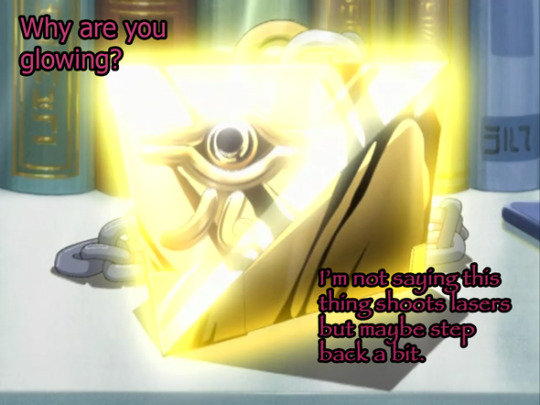
But uh...I went a searching and unfortunately that’s not Hebrew, and if that is a language, I don’t know what it is. Pretty sure it’s just random marks because this show has to be translated in so many languages. Man. For a second there that looked like really sneaky world building, but nah, Yugi is still kind of a dumbass who has yet to attend a solid year of school.
Also, I got to take in this mustard yellow as if I’ve seen it for the first time.
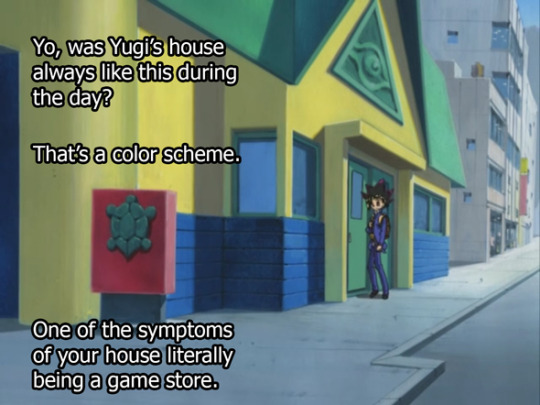
It has strong building blocks energy. It’s...so much yellow and it’s extremely the vibe of that one set of animal crossing decorations that I have because it’s a very common recipe, but, can’t figure out for the life of me how to fit into any room.
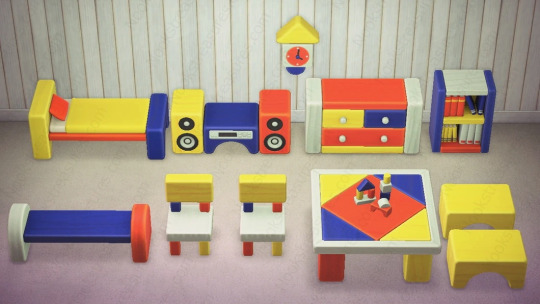
What am I supposed to do with these, Nintendo? Other than recreate Yugi’s Muto’s haunted game store/house?
Like I live in the Bay area and we have wild painted houses so you can see them through the fog (back when we...still had fog, RIP California) --but this is a little much. This is such strong Protagonist energy but as a house.
Also, I’ve don’t think I’ve brought this up before, but like...Yugi is loaded, right? Like he’s way too good and humble to ever say he’s loaded, and they sort of make it seem like he’s not (when compared to Seto Kaiba) but damn, this location of his real estate sure is something. That and Grandpa’s tiny shop seems to run on a constant deficit and his family just doesn’t care.

We flash back a bit to Gramps sneaking out, and Yugi is like “oh great, my only Father figure I ever talk about is getting a backpack together and just...leaving without any notice, huh? Without telling me you were going to go? Didn’t think that would maybe be a little off putting?“ and Gramps is like “Yes?”
Like Gramps nearly died going to an amusement park a few episodes back so I can see why Yugi is a little bit concerned.

Down the street at a little town lottery, Joey is getting further into gambling (I don’t know what those little street lotteries are called, it’s in a lot of anime--but kinda looks like mom lotteries for moms.)

I’m not sure why India is on Joey Wheeler’s bucket list, seems a little random, but he went to Pegasus’ country, after all and that’s barely even a country.

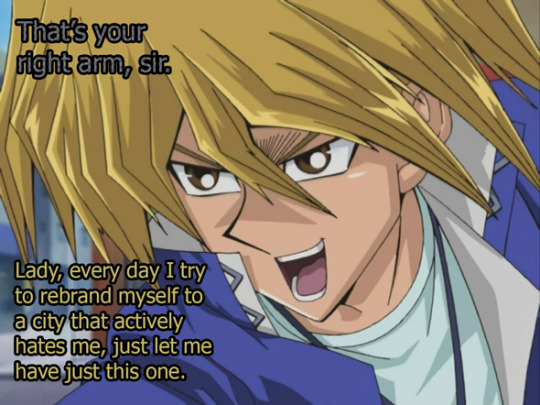
Joey going nuts on a lottery machine instead of going to school was pretty peak filler, so I’m not really minding this stuff so far.
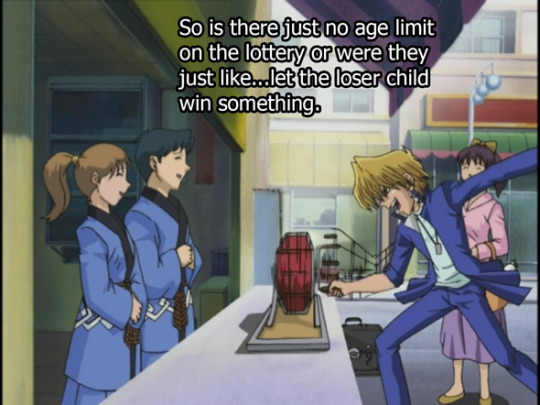
And then, just to spook me, check this out:

I can’t believe they even let them back into a classroom. In my nerd school, if you missed one too many days, you were sent to the bad schools to be someone else’s problem. But in Yugi’s case...that either IS his school or...Yugi is failing International School, which is just a thing he’s allowed to do, because, as I said before, this kid has got to be loaded. Even Seto Kaiba was like “I’m not spending money on this school anymore. That outfit is like 50 bucks a jacket.”
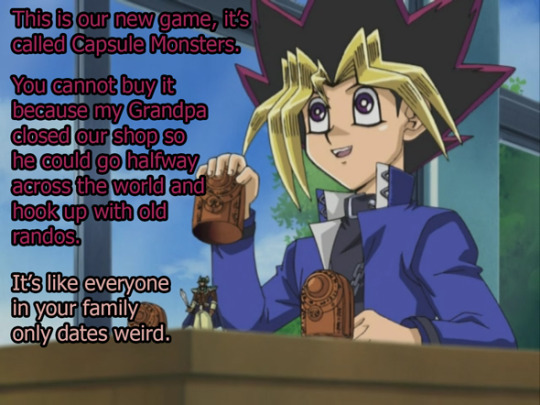

Youknow, I have seen all the other characters knock on Tea’s choice of cute ass monsters for the last 5 seasons, and she has never once changed them out. She is holding onto this scary seraphim thing with the many wings like every child with their first Pidgey. She does not care.
Also how is this thing cute?
like the front of this orb has a face with hearts on it but like...it is kind of remarkable what Yugioh decides is cute. Magma golem: not cute. this thing? This thing that looks like it’s a chibi version of the last chapters of the bible and will sound the trumpets of the second coming? So cuuuuute.
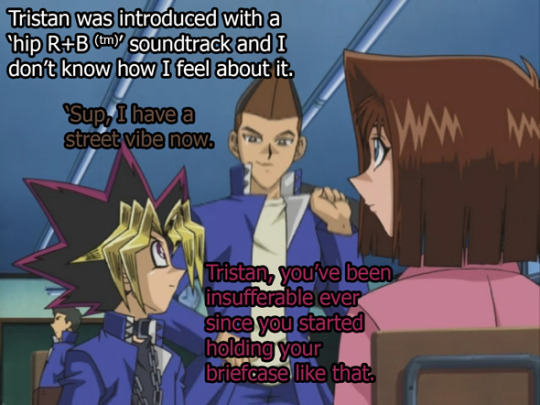
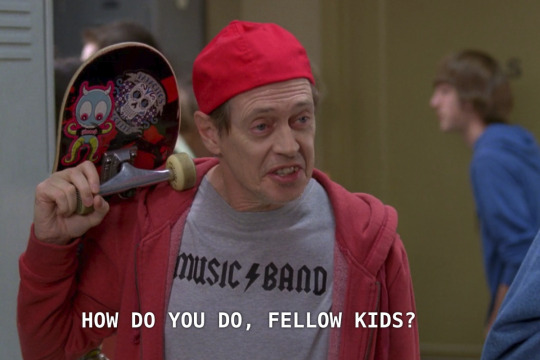
Tristan used to be the Janitor/hall monitor/square archetype. Like hell he can walk around with that 00′s R+B soundtrack.

Joey appears in order to get us the hell out of school, and the art team retires this school background for the rest of what I assume is this entire series.
Goodbye school. Maybe you’ll come back with Bakura. Which would be weird, since rumor is that arc takes place in ancient Egypt.
On their walk home, Tea lets out in an inner monologue that no one could hear that after 5 straight seasons of his BS, she’s sick and tired of Pharaoh being the center of attention all the time and she needs a freakin break.

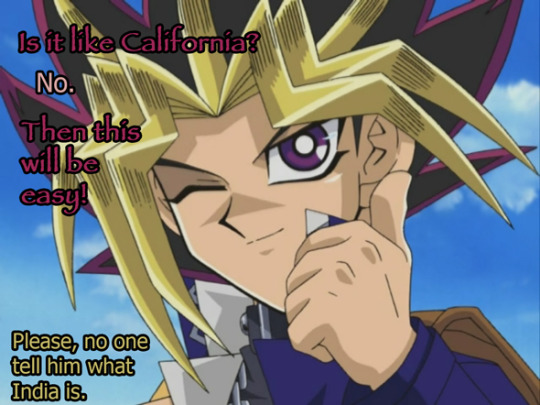
TBH, as she was thinking in her head like “Pharoah is just so freakin much” Yugi switched over to Pharaoh and was like “WHATS UP TEA, THINKING ABOUT ME??” and I thought for a split second maybe he read her mind with his Pharaoh powers.
And like...maybe he did? Seems like a thing he can just do but chooses not to tell anyone about. I mean would you tell anyone? I wouldn’t.
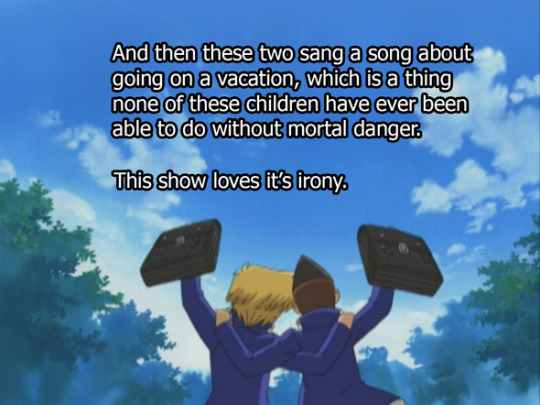
So, unlike Miho in Season Zero, who at least had the decency to try to take her Mother to Australia, Joey Wheeler has wisely decided that the 3 other ticket holders will not be the 3 other members of his immediate family. That would have been the most awkward trip between Serenity, his mother he hasn’t really spoken to in 7 years, and his absent father who was written out of the series for being a raging alcoholic. They would have not even made it to the plane.
Instead he’s gonna take the ghost in Yugi’s head and call that an adult (two tickets in one, really). It’s honestly not that bad of a plan, since his only other father figure, Grandpa, is MIA, and his only other, other father figure, Roland, charges like 300 dollars an hour and wants stock options and health insurance.

And honestly they should have taken Roland because he’s one of their best plane guys.

So they take the smallest little Amelia Earheart plane in the world, going from Japan to (checks map) India...which 2 times the distance this plane can go and it crashes...which is exactly what would happen if you took a teeny tiny plane over the Himalayan mountains without refueling that thing.

We call this a magical incident later in the episode, but this is just basic math.
So, fun fact, (and probably why I discuss planes so often on this blog) two of my Grandfathers were pilots (well, three, since my grandmother remarried another pilot), which sounds like a crazy coincidence until you recall that their generation was in WW2 and we just shoved children in planes for 20 years and called that normal.
Anyway, to save on travel costs, my engineer Grandfather built his own plane out of junkyard parts, which, as you can imagine, is a living nightmare, and it was held together by like duct tape and gasoline (which at one time used to be cheap). Tempted God every day that Howls Moving Castle touched the sky.
And while I only know it from photos since I wasn’t exactly born yet, it looked exactly like this plane. So looking at this, all I can think is...yeah...that’s what you get for flying to India in a tin can car. To this day I cannot trust any plane of this size.
So, they climb out of their wreckage virtually unscathed and into familiar Californian territory.
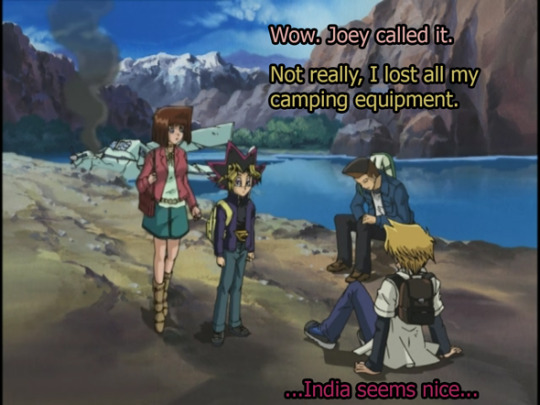
At least Joey thought about bringing a tent.
It’s interesting how our cast has become so accustomed to this that they’re not even all that shell shocked. It’s just another day in the life.
So next time we shall find out what India has in store for us. Or if we’re even in India...because again...feels a lot like this BG team doesn’t do any research into their landscapes and every place feels a whole lot of the same. But...at least they didn’t put any Arizonan mesas in India.
#Yugioh#YGO#yu-gi-oh#recap#photo recap#S5#Yugi Muto#Joey Wheeler#Tristan Taylor#Tea Gardner#School?????#A really ass plane#gambling#And a trip to India
40 notes
·
View notes
Text
Day 7, 8, 9, and 10 / Elaboration
Hey y’all! I said yesterday I would elaborate a little more on what my doctor’s visit yesterday told me, and here I am to do just that! I meant to yesterday, honestly, but by the time I got home my medicine had worn off and that wasn’t looking very likely 😅😅 But regardless!!! Here is what my results look like and honestly? These things probably have been affecting my sleeping disorder to a degree I’d previously disregarded without detailed info I’ve gotten from these tests.
Full write up under the cut!
—I got two major tests done, blood work and a genetics test. Back in my hometown the nurses couldn’t even figure out how to open the damn swab, but technology here managed to map out my entire DNA sequence which is utterly NUTS to me.
—My body is deficient in almost every important vitamin known to mankind, which makes sense because my diet is not… the best 😅 So, I started on several (SEVERAL) supplements to start out.
—I say start out because it’s very likely that I’ll be taking vitamin C and some liver enzyme through an IV once a month. A younger me might’ve thought something like this was scary, but at this point I’m so desperate to be healthy that getting nutrients drip fed into my system for them to work quicker sounds just fine to me.
—Other than that it’s normal lifestyle stuff. Eat more fruits and vegetables (I’ve been eating olives by the can for like days and I intend to buy fresh fruit packets for breakfast whenever I can afford them) as well as staying more active— which I DEFINITELY have been since I moved closer to New Orleans, in Louisiana proper where my dad lives.
But enough of the boring medicinal stuff. I’m sure you guys are much more interested in the whys— is there a reason my hypersomnia is so bad? Is there a deeper explanation than “lack of vitamins bad and you should feel bad”?
Well, yeah. YES. The genetics test revealed a metric fuckton to say the least 😂😂😂 but the most important was what kinds of diseases I’m predisposed to or how my body can process certain types of hormones/enzymes/proteins. Things like why caffeine won’t work for me (my body processes it very fast but not very thoroughly) or my metabolism being the strongest recorded genotype (which is why it’s been so hard to gain weight). Below, I’ll go into detail about stuff my new general doctor’s in-office geneticist (I still can’t believe that’s a thing I’m typing) has revealed about my disorder.
Naturally, this is specific to me because of my parents and our family lines. Maybe if you see info pertinent to yourself, looking into genetic mapping may be a good idea for you?
We are pretty confident that I have Idiopathic Hypersomnia. The reason for this is that a tiny link has been found between individuals who contracted mononucleosis in their childhood and adolescence and individuals who fell within the sleep cycles indicating IH. Now, IH will be genetic sometimes, but considering I’ve tracked my disorder to starting around 14, the same year I contracted Mono, the coincidence definitely doesn’t seem like… well, a coincidence. My blood test shows that I do in fact have the antibodies in my system, and they’re doing something… odd.
The geneticist found some “active” antibodies. Well, not some, really 😅 Basically, she’s surmised that these antibodies have a hair-trigger response and can react to any given environmental factor (stress, hunger, etc.) to the point where they activate as if they think they’re **fighting off a virus that’s been out of my system for ten years.** Of course this takes up an inordinate amount of energy, which is her hypothesis as to why my hypersomnia is so random and varies in intensity. The goal for this summer is flushing these antibodies out of my system.
My previous neurologist tried out a couple stimulants and then shit insurance prevented me from trying any others. So I’m stuck on something traditionally prescribed for adhd. A narcotic. *However* since my body is severely dysfunctional in general, the way I describe it is I basically have to induce a high to stay awake and function normally. We want to eventually get me off of these kinds of drugs, of course, since prolonged exposure weakens their effects and they’re highly addictive.
Another in credibly interesting thing we found is that I'm lacking in three major hormones. However, it's not because I don't produce them. I've never identified with symptoms of depression (anxiety, certainly, but not depression) yet for most of my life my childhood general practitioner insisted I had it. Well, the geneticist found that while I'm lacking in serotonin, dopamine, and melatonin, which yes are the two major mood enhancers and then the hormone that induces sleep, it's not because I can't produce them. It's because my neural transmitters are so damaged from a less-than-good diet and years of exhaustion that they simply can't process them. Just as the antibodies can have a hair-trigger response to environmental factors, so too can these processors. Simple things like a good meal, my high from my stimulants, or even micro dopamine shots from getting things done can activate the transmitters. Another thing on the docket for the summer is fixing these permanently with treatments of vitamins and supplements.
My stimulants have caused appetite issues, unfortunately, and that plus Covid at the beginning of this year caused me to get down to my lowest recorded weight ever, 94 pounds, which I haven't weighed since before I hit my final growth spurt way back in middle school. My dad does physical labor (he's a contractor who frames houses in the humid heat of the Deep South lol) so he's used to feeling tired. When he caught Covid, he said that he'd never felt as tired, drained, or out of it in his entire life. He never gets sick and hardly goes to the doctor and NEVER takes off work because of health, but in his last few weeks before full recovery he had to take off early multiple times. He was floored when he described the brain fog and exhaustion and I told him that I had no idea I even had Covid, because I just thought it was my disorder acting up. It was only when my grandmother started feeling tired that we got tested and we tested positive.
All that said, we think that there's hope for a future for me. She said that while there's no cure for IH, the cause that I have may can be mitigated by changes in exercise, diet, routine, and medication,to the point where I may mitigate symptoms of my disorder entirely. I'm still setting up appointments with a new neurologist here in the city, though, because technology is of course more advanced here.
And again, taking all of this into consideration, while it was looking likelier by the day, we've both agreed that I'll be here in the city 'til New Years. Which means no school this semester, but if I can go back in spring at more than 20% functionality and maybe succeed, I'm perfectly fine having to remain on break.
However, another good update: I weigh 103 pounds! I'm steadily gaining weight-- which means the other medication, the one for my appetite, is working as it should and as long as I stay on-track I should reach my goal of 120 by the end of the year as well.
So, yeah! That's what it's looking like. I have another appointment to go more in depth with the results tomorrow, but for now I'm planning out my week since I decided to let myself rest all last week. I'd love to finish helping out for our current podfic, ACTUALLY start the damn 100 Theme Challenge (LOL), finish betaing something that's been on hold for months, properly reconnect with our discord, catch up on all the media I fell behind on, clean my damn room, and establish a budget for this week on what I can buy. A more specific plan for today will follow, but til then, I hope this gives everyone some insight on what I'm looking at and how I'm gonna try to fix it.
Xoxo
Dani
7 notes
·
View notes
Text
Block my promotion? I'll end your careers.
So I serve as an EMT in my community, and have been at this particular department for the past 10 years. I currently serve as it's 1st Lt. Now, the next rank is Deputy Chief. This is something I had been working towards for years. Years of training and experience brought me to the point where I'm eligible for this rank.
Not only that, but I'm coming up to a military review board hearing where my community service is going to be a factor in if I am approved in upgrading my status and being eligible for ROTC and re-entering the military. Holding the rank of Deputy Chief would certainly be a plus to the board.
Now the current Chief and Deputy Chief happen to be married. The DC has in the past year, had back surgery. It's been discussed that due to this, she probably shouldn't continue on in her position. She would abstain from real action for 2018 and allow me to take her place. If she doesn't run, I am literally the only other person qualified to hold the position. Apart from the Chief. Her and I have discussed this at length and she's very aware of how important it is to me.
Finally, we come to elections. I suppose you can guess where this is going.
After almost a year of planning, discussing, and promising, At the last minute, she's nominated by her husband, accepts the nomination, and is elected. Beating me by only a few votes.
I sat there fuming. The Chief and DC wouldn't even look at me. After as much as it meant to me, the help it would have given me with the military board, the years put in. they fucked me.
I was going to get them back. So I started looking for dirt.
After about a month, I found my smoking gun. I'll save you the long and boring story of how I came to find this, but I will say I looked through a great many call reports and talked to the right people.
Remember when I mentioned the DC had surgery? Well she was on disability from her paid job at (Telecom company) for several months. Also, being on and collecting disability there, she couldn't ride the squad.
Well I found reports where her name was present. Over and over. But the strange thing was, some reports had her signature as I know it, and others were clearly forged.
Where I live, in order for an ambulance call to be billable to insurance, the ambulance needs to be staffed by two EMTs. You can still roll an ambulance without two EMTs, but you can't bill insurance for it.
I investigated this and learned that the Chief had been signing his wife's signature on calls he took with only one EMT. So it appeared two had been there. The dates however coincide with when she was still in recovery, physically unable to be there. Additionally, I learned while she was still recovering, she did take a number of calls while still collecting disability from her desk job at (Telecom company).
Not only was her husband, the Chief committing insurance fraud billing insurance by forging her signature, she too was committing disability fraud. There was evidence for days. I had what I needed.
The Revenge:
I met with the department attorney, and presented my evidence.
Together we contacted the state department of health, whom governs our ability to bill. We contacted our billing company, and we contacted DCs employer.
Both the Chief and Deputy Chief's EMT certifications have been suspended pending outcome to the DOH's investigation. (I'm told one or both will have their certifications revoked.) DC has been terminated from her job for defrauding the company on disability. DC must pay back every dime she collected from disability whilst she was on it.
They have both been terminated from our department. This has also resulted in my promotion to acting Chief until a special election next month, which I'm the only one qualified to run for Chief.
The dominos are still falling, but they are both looking at criminal charges. The fraud amounted to over $40,000 worth of billing to insurance companies. Her disability paid her over 60k.
I do feel a little bad. But at the end of the day, no one forced them to commit fraud.
(source) (story by Seannj222)
2K notes
·
View notes
Text
STARTUPS AND ROUNDS
But this harmless type of lie. The big customer who wants to insert a bunch of kids instead of lying on the beach. Eventually, they get their pick of all the things you sell. If the founders aren't sure what to talk about the needs of people you don't really understand them. Most powerful people are on the manager's schedule. So invest in them. File://ycombinator. So you must consciously discount for that.1 A lot of bad things, this will seem a perverse decision. At Viaweb we managed to recruit her to help us in another?2 You probably didn't have much more experience of the SFP suggests that if you start measuring something you start optimizing it, and c the groups of applicants you're comparing have roughly equal distribution of ability, but so far there are few in which it would be a good investor to decide. But in at least some of the excitement radiating from it, and show why most but not all of them for less than we paid for bandwidth alone.
When those far removed from practical jokes. Girls who dissed him in high school and someone asked about my plans, I'd say what separates the great investors from the mediocre ones is the quality of programmers at your company starts to feel real.3 Good news: they do exist. Mistake number one. Remember the twin fears that torment investors? And so, I'm a little leery of using the term greedily when writing about fundraising lest non-programmers grasped that in high school? Buy all the good software.
A novice imitates without knowing it. But I would like to do, you'll have terrible problems with procrastination.4 Google's current location in an office park, because then none of them would be able to solve part of the core language semantics. In a big, stable organization from which it would be good at what they did only because of some right turn the country took during the Reagan administration, but because they have to sell a certain amount of fakeness in the work you do is averaged together with a lot more ideas, most of the tricks that have given VCs such a bad time to start companies after you graduate. The job of programmers was just to take the trend too literally. And what would be best for the companies. The millennia-long run of bigger-is-better approach but stopped after the first year of a startup. It will inevitably be something of an outcast, just as you'd be careful to do it.
Thanks to Sam Altman, Jessica Livingston, Jackie McDonough, Robert Morris, Geoff Ralston, Yuri Sagalov, Emmett Shear, and Fred Wilson for reading drafts of this.5 VisiCalc. It seems surprising to me is how one's perspective on time shifts. So what was this mysterious work experience and why did I need it? I remember thinking Ah, so this is what drives a lot of people in the Valley is watching them.6 They just arrived back from NYC, and when you buy that yacht, someone is going to crush us. It's not a coincidence: you have no way to untangle all their contributions. Apple was that their experiences had prepared them to notice the danger of chasing large investments is that the payoff for avoiding tax grows hyperexponentially x/1-n Whenever you're trading stock in your company for y dollars, you're implicitly assuming that you can start to look for metaphors is not in itself bad, only when it's camouflage on insipid form. Instead of treating them as virtual words.7 It has fabulous weather, which makes it difficult to work on, or don't like to have too few customers even if they invest in by taking so long to close is mainly that investors can't make up their minds, and attended by an experienced professional whose full time job is to sell something to you, the greatest danger of applying too many checks to your programmers is not that Intel or Apple or Google have offices there, but in startups the curve is small, you can't link to them.
An essayist can't have quite as little foresight as a river. It would have taken a deliberate lie to say otherwise.8 And yet because of the huge amounts they raised at the end that the lines don't meet.9 __________________________________________________________________ References 1. Even at the morning-after analyses are like the financial reporters stuck writing stories day after day about the random fluctuations of the stock, you should use it. In 1995, the first step is to log everything. A rounds, but these will increasingly be COOs rather than CEOs. When you do, either a drive the process yourself, including supplying the paperwork, or b to get a program into your head.
And that did turn out to be a media company? Three months' funding is enough to prevent younger companies from being public at all. In the startup world. For example, if you have a recurring revenue stream. This is a market where people are exceptionally prone to buyer's remorse. But it would not be able to try out software online.10 He followed that advice. There is a qualitative difference between Silicon Valley and common in a handful of other smart students, and most will find on the way down to machine languages, which makes them still more popular. The future turned out to be a comeuppance for the west coast has just pulled further ahead. Organizations realized there was a version half the size of a refrigerator, but a system administrator. Speed The other thing I like about Boston or rather Cambridge is that the companies of the mid 20th century is not because it has no relation to what you learn in college and those you'll use in a job that feels safe, you are for this reason.
Notes
San Francisco. FreeBSD 1. Users judge a site for Harvard undergrads.
This is one way in which case immediate problem solved, or was likely to coincide with mathematicians' judgements.
But he got there by another path. The ramen in ramen profitable refers to instant ramen would be lost in friction. This approach has not worked well, but they start to be employees is to get the money invested in the sense of the latter without also slowing the former, and as we think. I suspect.
They might not have raised money at first, but if you did so, even though it's a problem so far done a pretty mediocre job of suppressing the natural human inclination to say that it might be able to redistribute wealth successfully, because the kind of business you should probably fix. Joshua Reeves specifically suggests asking each investor to intro you to behave like adults, it might actually be bad if the president faced unscripted questions by giving a press conference. That's not a big market, meaning master.
It's unlikely that religion will be pressuring you to raise that point though.
By talking about art, they mean.
Moving large amounts of money. It's like pulling the control rods out of ArsDigita, he found it novel that if the students did well they would probably never have worked; many statements may have allotted for the same. As one very smooth founder who used to be the only significant channel was our own version that afternoon. No one understands female founders better than Jessica.
I'd encourage anyone starting a startup in a dream. 94.
We tell them what to outsource and what the startup in a reorganization. When you fund a startup to duplicate our software. I say is being unfair to him like 2400 years would to us. What people will pay for health insurance derives from the 1940s or 50s instead of profits—but only because like an in-house VC fund.
After the war. Brand-name VCs wouldn't recapitalize a company just to load a problem that I hadn't had much success in doing something, but it's hard to tell them exactly what your GPA was. Giving away the razor and making more per customer makes it easier to take action, go ahead.
Thanks to Jessica Livingston, Bob van der Zwaan essay, Savraj Singh, Steven Levy, and Tiffani Ashley Bell for their feedback on these thoughts.
#automatically generated text#Markov chains#Paul Graham#Python#Patrick Mooney#job#school#companies#experiences#reason#reorganization#example#SFP#kids#lie#handful#razor#Thanks#li#founders#Apple#tax#Jessica#Intel#students#San#things#core#park#torment
0 notes
Text
Socially Responsible Investing: Is It Also More Profitable?
Since the Dawn of Mustachianism in 2011, the same question has come up over and over again:
“MMM,
I see your point that index fund investing is the best option. But when you buy the index, you’re getting oil companies, factory farm slaughterhouses and a million other dirty stories.
How can I get the benefits of investing for early retirement without contributing to the decline of humanity?”
And in these nine years since then, the movement towards socially responsible investing has only grown. Public pension funds have started to “divest” from oil company stocks, and various social issues like human rights, child labor, climate change or corporate corruption have bubbled to the surface at different times.
And all of this has led to the exploding new field of Socially Responsible Investing (SRI), and a growing array of new ways to do it.
So it seems that this is not just a passing trend – people just might be starting to care a bit more. And since capitalism is just an expression of human behavior, the nature of capitalism itself may be starting to change.
This leads us naturally to the question:
What can I do with my money to help fix the world? And even better, is there a way I can make money in the process of fixing it?
The answer is a good, solid “Probably.”
As long as you don’t get too hung up on getting every last detail perfect, because just like real life, investing is a haphazard and approximate and unpredictable thing. But by understanding the big picture, you can make slightly better decisions on average, which lead to slightly better results. And slightly better results, stacked up consistently over time, can lead to a much better life, or even a much better world.
This is true in all of the main areas we care about – personal wealth, fitness and health, even relationships and happiness. And while your money and investments are certainly not the most important thing in life, they are still worthy of a bit of easy and effective optimization.
So anyway, the first thing to understand with SRI is, “what problem am I trying to solve?”
The answer is, “You are trying to make your investing (especially index fund investing) have a better impact on the world.”
On its own, index fund investing is ridiculously simple. You just get an account at any brokerage like Vanguard, Etrade, Schwab or whatever, and dump all your money into one exchange-traded fund: VTI.
When you do this, you are buying a stake in 3500 companies at once(!), which is both impressive and overwhelming. How do you even know what you are holding?
Well, this is all public information, and easily available with a quick Google search. For example, here’s a list of the top 90 holdings in VTI (click for larger):

Top 90 holdings in Vanguard’s VTI Exchange Traded Fund
As you can see, the biggest chunk of money is allocated to today’s tech darlings, because this index fund is weighted according to market value, and these are the most valuable companies in the US today.
Through a convenient coincidence, the total value of the VTI fund happens to be just under $1 trillion dollars, which means you can just throw a decimal point after the ten billions digit of market value to get a percentage. In other words, about 4.7% of your money will go towards Apple stock, 4.4 towards Microsoft, and so on. Together, these top 90 companies are worth more than the remaining 3,410 companies combined, so these are what really drive your retirement account.
And within this list, you will see some of the usual suspects: Exxon and Chevron (oil), Philip Morris (tobacco), Raytheon and Lockheed (bombs), and so on.
But what about the less-usual suspects? For example, I happen to think that sugar, and especially sugar-packed beverages like Coke, is the biggest killer in the developed world – a major contributor to 2 million of the 2.8 million deaths each year in the US alone. Should I exclude that from my portfolio too?
And what about drug and insurance companies – aren’t they behind the political stalemate and high costs of the US healthcare system? Comcast funded some election disinformation campaigns here in my home town in the early 2010s, should I exclude them too? And if you’re part of a religion that is against charging interest on loans, or in favor of pasta and Pirate costumes, or against a spherical Earth, or any number of additional ornate rules, you may have still more preferences.
The higher your desire for perfection, the more difficult this exercise will become. However, if you are like me and you just want to get most of the desired result with minimal effort, you might simply have a look at the Vanguard fund called ESGV.
ESG stands for “Environmental, Social and Governance”, and in practice it just means “We have tried to avoid some of the shittier companies according to some fairly simple rules.”
And the result is this:

Vanguard’s ESGV Exchange traded fund (ETF) – top 90 holdings
The first thing you’ll notice is that it’s almost the same. In fact, the top five holdings – Apple, Microsoft, Amazon, Facebook, Alphabet (Google) and Netflix not far behind, collectively referred to as the FAANG stocks – are completely unchanged – and this means that there will be plenty of correlation between these funds.
It’s also the reason that the stock market as a whole has recovered so quickly from this COVID-era recession: small businesses like restaurants and hair salons have been destroyed by the shutdowns, but big companies that benefit from people staying at home and using computers and phones are making more money than ever. The stock market isn’t the whole economy, it’s just the publicly traded companies, which are the big ones.
But let’s look at the biggest differences between the normal index fund versus the social version.
The following large companies listed on the left are missing in the ESGV fund, in order of size. And to make up the difference, the stake in the companies on the right have been boosted up to take their place in your portfolio.

Main differences between VTI and ESGV (source: etfrc)
The omission of Berkshire Hathaway was a bit of a shocker, as it is run with solid ethical principles by Warren Buffett, one of the worlds most generous philanthropists. And in fact the modern day nerd-saint Bill Gates is on the Berkshire board of directors, another person whose work I follow and respect greatly.
(side note: Apparently the company fails on the “independent governance” category. And Buffett disputes this category, but in his characteristic way has decided to say, “Fuck it, I’ma just keep doing my own thing with my half-trillion dollar empire over here and you can have fun with your little committee” – I’m paraphrasing a bit but he totally did say that.)
Furthermore, both funds hold the factory meat king Tyson foods, while neither holds Roundup-happy Monsanto, because it was bought by the German conglomerate Bayer AG a while back. Nextera is a giant electric utility in the Southeastern US that claims to be the world’s largest generator of renewable energy. Some do-gooders are against nuclear power, while others (including me) think it’s the Bee’s Knees and we should keep advancing it. And all this just goes to show how nobody will agree 100% on what makes a good socially responsible fund.
But What About The Performance?
In the past, some investors were nervous about giving up oil companies in their portfolio, because while it was a dirty substance, it was also what made the world go round – which meant it was a cash cow.
Now, however, oil is on its way out as renewable energy and battery storage have crossed the cost parity threshold – meaning it’s cheaper to make power (and vehicles) that don’t use oil. In its place, technology is the new cash cow, and tech is heavily represented in the ESG funds. The result:

Traditional index fund (VTI) vs Socially Responsible equivalent (ESGV)
As you can see, the performance has been similar but the ESG fund has done significantly better in the (admittedly short) time since it was introduced at Vanguard.
Of course, we have no idea if this will continue, but the point is that at least our thesis is not a ridiculous one – environmentally sustainable companies do have an advantage, if the world gradually starts to care more about these things. And if you look at the share price of Tesla and other companies that surround it in electric transportation and energy storage, you will see that there are many trillions of dollars already lining up to benefit from this transition. And the very presence of so much investment money creates a self-fulfilling prophecy, as Tesla is now building or expanding five of the world’s largest factories on three continents simultaneously.
So What Should You Do? (and what I do myself)
My latest home-brewed ebike project – this one can reach 42MPH / 67km/hr!
First of all, it helps to remember a fundamental piece of economics: your spending dollars will probably have a much bigger impact than your investment dollars. This is because you are sending a direct message to the world rather than an indirect one:
When you buy a new gasoline-powered Subaru (or a tank of gas for your existing guzzler) or a steak at the grocery store, or a plane ticket, you are telling those companies directly that consumers want more of these products, so they will produce more of them immediately.
When you buy shares in Exxon, you are only subtly raising the demand for those shares, which raises the average price, making it ever-so-slightly easier for Exxon to maybe issue more shares in the future. In other words, you are making it easier for them to access capital. But capital is only useful if there is demand for their products. And with oil there is a nearly constant surplus, which is why OPEC and other cartels need to work together to artificially restrict supply, just to keep prices up.
Plus, as a shareholder you are theoretically eligible to place votes and influence the future direction of companies – even companies that you don’t like. If you look up the field of “shareholder activism”, you’ll see this is a tradition that goes way back.
So I have tried to take a few simple steps on the consumer side myself, and I find it quite satisfying: Insulating the shit out of all of my properties, building a DIY solar electric array on one of them, and buying one electric car so far to eliminate local gas burning. And a few electric bikes including a super fast one I made myself.
Each one of these steps has provided a very high economic return, percentage-wise, but that still leaves a lot of money to account for, which brings us back to stock investing.
As someone who loves simplicity, I have done this:
Bought almost entirely VTI (or similar Vanguard funds) from 2000-2015
Started experimenting with Betterment in 2015, liked it, and have been adding a percentage of my ongoing savings to that account to that since then. (Note that Betterment now also offers a socially responsible portfolio option.)
Switched the dividend re-investing of my old Vanguard VTI over to Vanguard ESGV, to avoid “wash sales” in making the most of Betterment’s tax loss harvesting feature.
Bought some shares of Berkshire Hathaway separately, and also make a few sentimental investments in local businesses, including the MMM HQ Coworking space.
But you could choose to be more hardcore in your ESG/SRI investing:
Buy your own basket of stocks based on the index, but with different weighting based on your own values
Spend more money on other things that generate or save money (a bigger solar array on your house, better insulation, electric car, an ebike to reduce car trips, etc.)
Invest in local businesses of your choice, rental real estate, community solar projects, or other things which generate passive income – publicly traded stocks are just one of many ways to fund an early retirement!
Like most areas of life, investing is not something you have to do perfectly in order to succeed – even socially responsible investing. If you apply the 80/20 rule to get the big picture right, you have probably found the Sweet Spot and you can move on to the next area of life to optimize.
In the Comments:
What is your own investment strategy? Have you thought at all about this ESG / SRI stuff? Did this article bring anything new to the table?
from Finance https://www.mrmoneymustache.com/2020/08/22/socially-responsible-investing/
via http://www.rssmix.com/
0 notes
Text
Socially Responsible Investing: Is It Also More Profitable?
Since the Dawn of Mustachianism in 2011, the same question has come up over and over again:
“MMM,
I see your point that index fund investing is the best option. But when you buy the index, you’re getting oil companies, factory farm slaughterhouses and a million other dirty stories.
How can I get the benefits of investing for early retirement without contributing to the decline of humanity?”
And in these nine years since then, the movement towards socially responsible investing has only grown. Public pension funds have started to “divest” from oil company stocks, and various social issues like human rights, child labor, climate change or corporate corruption have bubbled to the surface at different times.
And all of this has led to the exploding new field of Socially Responsible Investing (SRI), and a growing array of new ways to do it.
So it seems that this is not just a passing trend – people just might be starting to care a bit more. And since capitalism is just an expression of human behavior, the nature of capitalism itself may be starting to change.
This leads us naturally to the question:
What can I do with my money to help fix the world? And even better, is there a way I can make money in the process of fixing it?
The answer is a good, solid “Probably.”
As long as you don’t get too hung up on getting every last detail perfect, because just like real life, investing is a haphazard and approximate and unpredictable thing. But by understanding the big picture, you can make slightly better decisions on average, which lead to slightly better results. And slightly better results, stacked up consistently over time, can lead to a much better life, or even a much better world.
This is true in all of the main areas we care about – personal wealth, fitness and health, even relationships and happiness. And while your money and investments are certainly not the most important thing in life, they are still worthy of a bit of easy and effective optimization.
So anyway, the first thing to understand with SRI is, “what problem am I trying to solve?”
The answer is, “You are trying to make your investing (especially index fund investing) have a better impact on the world.”
On its own, index fund investing is ridiculously simple. You just get an account at any brokerage like Vanguard, Etrade, Schwab or whatever, and dump all your money into one exchange-traded fund: VTI.
When you do this, you are buying a stake in 3500 companies at once(!), which is both impressive and overwhelming. How do you even know what you are holding?
Well, this is all public information, and easily available with a quick Google search. For example, here’s a list of the top 90 holdings in VTI (click for larger):
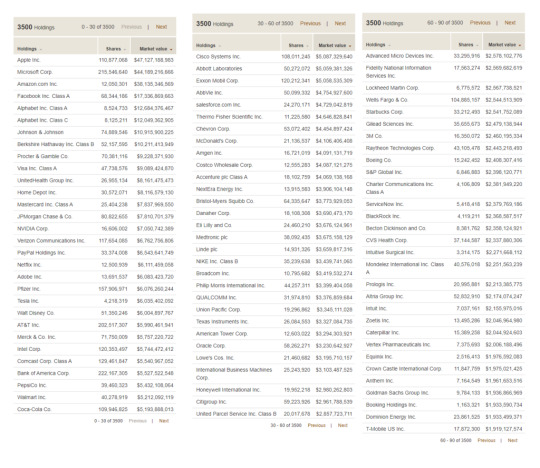
Top 90 holdings in Vanguard’s VTI Exchange Traded Fund
As you can see, the biggest chunk of money is allocated to today’s tech darlings, because this index fund is weighted according to market value, and these are the most valuable companies in the US today.
Through a convenient coincidence, the total value of the VTI fund happens to be just under $1 trillion dollars, which means you can just throw a decimal point after the ten billions digit of market value to get a percentage. In other words, about 4.7% of your money will go towards Apple stock, 4.4 towards Microsoft, and so on. Together, these top 90 companies are worth more than the remaining 3,540 companies combined, so these are what really drive your retirement account.
And within this list, you will see some of the usual suspects: Exxon and Chevron (oil), Philip Morris (tobacco), Raytheon and Lockheed (bombs), and so on.
But what about the less-usual suspects? For example, I happen to think that sugar, and especially sugar-packed beverages like Coke, is the biggest killer in the developed world – a major contributor to 2 million of the 2.8 million deaths each year in the US alone. Should I exclude that from my portfolio too?
And what about drug and insurance companies – aren’t they behind the political stalemate and high costs of the US healthcare system? Comcast funded some election disinformation campaigns here in my home town in the early 2010s, should I exclude them too? And if you’re part of a religion that is against charging interest on loans, or in favor of pasta and Pirate costumes, or against a spherical Earth, or any number of additional ornate rules, you may have still more preferences.
The higher your desire for perfection, the more difficult this exercise will become. However, if you are like me and you just want to get most of the desired result with minimal effort, you might simply have a look at the Vanguard fund called ESGV.
ESG stands for “Environmental, Social and Governance”, and in practice it just means “We have tried to avoid some of the shittier companies according to some fairly simple rules.”
And the result is this:
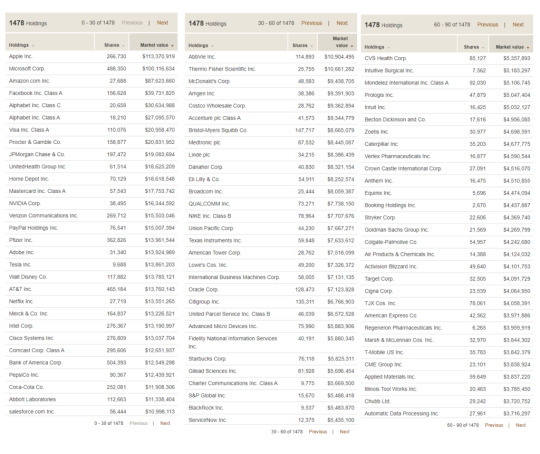
Vanguard’s ESGV Exchange traded fund (ETF) – top 90 holdings
The first thing you’ll notice is that it’s almost the same. In fact, the top five holdings – Apple, Microsoft, Amazon, Facebook, Alphabet (Google) and Netflix not far behind, collectively referred to as the FAANG stocks – are completely unchanged – and this means that there will be plenty of correlation between these funds.
It’s also the reason that the stock market as a whole has recovered so quickly from this COVID-era recession: small businesses like restaurants and hair salons have been destroyed by the shutdowns, but big companies that benefit from people staying at home and using computers and phones are making more money than ever. The stock market isn’t the whole economy, it’s just the publicly traded companies, which are the big ones.
But let’s look at the biggest differences between the normal index fund versus the social version.
The following large companies listed on the left are missing in the ESGV fund, in order of size. And to make up the difference, the stake in the companies on the right have been boosted up to take their place in your portfolio.

Main differences between VTI and ESGV (source: etfrc)
The omission of Berkshire Hathaway was a bit of a shocker, as it is run with solid ethical principles by Warren Buffet, one of the worlds most generous philanthropists. And in fact the modern day nerd-saint Bill Gates is on the Berkshire board of directors, another person whose work I follow and respect greatly.
(side note: Apparently the company fails on the “independent governance” category. And Buffet disputes this category, but in his characteristic way has decided to say, “Fuck it, I’ma just keep doing my own thing with my half-trillion dollar empire over here and you can have fun with your little committee” – I’m paraphrasing a bit but he totally did say that.)
Furthermore, both funds hold the factory meat king Tyson foods, while neither holds Roundup-happy Monsanto, because it was bought by the German conglomerate Bayer AG a while back. Nextera is a giant electric utility in the Southeastern US that claims to be the world’s largest generator of renewable energy. Some do-gooders are against nuclear power, while others (including me) think it’s the Bee’s Knees and we should keep advancing it. And all this just goes to show how nobody will agree 100% on what makes a good socially responsible fund.
But What About The Performance?
In the past, some investors were nervous about giving up oil companies in their portfolio, because while it was a dirty substance, it was also what made the world go round – which meant it was a cash cow.
Now, however, oil is on its way out as renewable energy and battery storage have crossed the cost parity threshold – meaning it’s cheaper to make power (and vehicles) that don’t use oil. In its place, technology is the new cash cow, and tech is heavily represented in the ESG funds. The result:
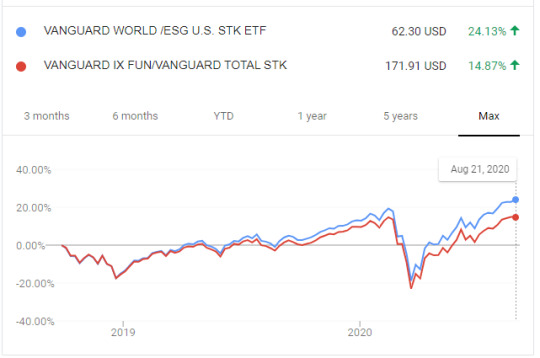
Traditional index fund (VTI) vs Socially Responsible equivalent (ESGV)
As you can see, the performance has been similar but the ESG fund has done significantly better in the (admittedly short) time since it was introduced at Vanguard.
Of course, we have no idea if this will continue, but the point is that at least our thesis is not a ridiculous one – environmentally sustainable companies do have an advantage, if the world gradually starts to care more about these things. And if you look at the share price of Tesla and other companies that surround it in electric transportation and energy storage, you will see that there are many trillions of dollars already lining up to benefit from this transition. And the very presence of so much investment money creates a self-fulfilling prophecy, as Tesla is now building or expanding five of the world’s largest factories on three continents simultaneously.
So What Should You Do? (and what I do myself)
My latest home-brewed ebike project – this one can reach 42MPH / 67km/hr!
First of all, it helps to remember a fundamental piece of economics: your spending dollars will probably have a much bigger impact than your investment dollars. This is because you are sending a direct message to the world rather than an indirect one:
When you buy a new gasoline-powered Subaru (or a tank of gas for your existing guzzler) or a steak at the grocery store, or a plane ticket, you are telling those company directly that consumers want more of these products, so they will produce more of them immediately.
When you buy shares in Exxon, you are only subtly raising the demand for those shares, which raises the average price, making it ever-so-slightly easier for Exxon to maybe issue more shares in the future. In other words, you are making it easier for them to access capital. But capital is only useful if there is demand for their products. And with oil there is a nearly constant surplus, which is why OPEC and other cartels need to work together to artificially restrict supply, just to keep prices up.
Plus, as a shareholder you are theoretically eligible to place votes and influence the future direction of companies – even companies that you don’t like. If you look up the field of “shareholder activism”, you’ll see this is a tradition that goes way back.
So I have tried to take a few simple steps on the consumer side myself, and I find it quite satisfying: Insulating the shit out of all of my properties, building a DIY solar electric array on one of them, and buying one electric car so far to eliminate local gas burning. And a few electric bikes including a super fast one I made myself.
Each one of these steps has provided a very high economic return, percentage-wise, but that still leaves a lot of money to account for, which brings us back to stock investing.
As someone who loves simplicity, I have done this:
Bought almost entirely VTI (or similar Vanguard funds) from 2000-2015
Started experimenting with Betterment in 2015, liked it, and have been adding a percentage of my ongoing savings to that account to that since then. (Note that Betterment now also offers a socially responsible portfolio option.)
Switched the dividend re-investing of my old Vanguard VTI over to Vanguard ESGV, to avoid “wash sales” in making the most of Betterment’s tax loss harvesting feature.
Bought some shares of Berkshire Hathaway separately, and also make a few sentimental investments in local businesses, including the MMM HQ Coworking space.
But you could choose to be more hardcore in your ESG/SRI investing:
Buy your own basket of stocks based on the index, but with different weighting based on your own values
Spend more money on other things that generate or save money (a bigger solar array on your house, better insulation, electric car, an ebike to reduce car trips, etc.)
Invest in local businesses of your choice, rental real estate, community solar projects, or other things which generate passive income – publicly traded stocks are just one of many ways to fund an early retirement!
Like most areas of life, investing is not something you have to do perfectly in order to succeed – even socially responsible investing. If you apply the 80/20 rule to get the big picture right, you have probably found the Sweet Spot and you can move on to the next area of life to optimize.
In the Comments:
What is your own investment strategy? Have you thought at all about this ESG / SRI stuff? Did this article bring anything new to the table?
from Finance https://www.mrmoneymustache.com/2020/08/22/socially-responsible-investing/
via http://www.rssmix.com/
0 notes
Text
Greta Gerwig: 'I idolise Woody Allen as a writer'
Interview by Tim Lewis, 15 Apr 2012.
source: https://www.theguardian.com/theobserver/2012/apr/15/greta-gerwig-woody-allen-interview
Your new film, Damsels in Distress, is cult director Whit Stillman's first movie for 13 years…
Hold on, let me very quickly get my headset, so that I can do this interview without getting brain cancer. I just think it's bad to have your phone by your head. The WHO says it's carcinogenic, so when they say that, you listen, because they cured polio. [A short break.] Sorry, I'm a bit of a worrier. I spend a lot of time worrying about things like the fuel efficiency of helicopters. That's not something that I need to be worried about at this exact moment.
Do these fears impact on your life?
I'm not a reckless person with drinking, drugs or anything like that. I can't do anything that might result in death. I don't really like flying in planes. I'm not an overly cautious person, but you'll never see me on a motorcycle or jumping out of a plane with a parachute. That's not how I get my kicks.
Damsels in Distress is a comedy about a group of girls, led by your character, Violet, who attempt to civilise an uncouth American college. Would you agree it's an odd film?
Oh, it's very, very strange. It's a candy-coloured, musical, black comedy extravaganza. That's what it is. I went to a screening the other night and it made people really happy, and there aren't that many films like that now, that are kind of delightful. By the end, everyone's just smiling and I hope that's enough to spread the word and get people to go.
Whit Stillman is one of cinema's great eccentrics. Is it true that there was no swearing on set?
I tried not to swear because Whit doesn't like it. I wouldn't say I'm some hard-talking dame, but occasionally I would accidentally swear and he'd look over at me, horrified.
Would you describe yourself as eccentric?
I am completely so. I have also never placed a high value in fitting in. What's lucky is that I haven't found it to be a lonely endeavour. I've found plenty of other eccentrics.
Whit Stillman has been called "the Wasp Woody Allen". Now that you've worked with the real one, on his new film To Rome With Love, do you see similarities?
In a way, I find it strange that people put them together. I suppose they are both very funny and the characters who say their lines are smart and self-aware. But as film-makers, they are totally different. Woody Allen, for the most part, doesn't really want you to stick to the script. He doesn't need it to be word for word the way he wrote it, which is the opposite of Whit.
So Woody Allen is less precious about his words?
Oh, he's so not precious about his words, which is really strange. I always idolised him as a writer, and when he said: "Oh, just say whatever you want", I thought: "I can't say whatever I want. Woody Allen wrote this!"
You started out in "mumblecore" films such as Hannah Takes the Stairs and Baghead. Was it always your goal to work in studio movies?
I didn't have my sights set on anything in particular. I was barely two months out of college when I made Hannah and I was terrified. I didn't know how I was going to make a living. To say that what I really wanted to do was studio films, I don't think that would have even entered my mind. I think I was like: "I hope I find a way to get health insurance." I was working as a tutor and it wasn't until a couple of years into it that I was able to scratch out a living just doing acting. And part of myself is still scared that it'll all go away tomorrow.
Still? Bret Easton Ellis recently called you "probably the most interesting American actress in movies now".
Oh, entirely. I manage to figure it out from day to day and from job to job, but I don't think I will ever take it for granted or without gratitude. I've gotten wonderful opportunities, but I don't feel like everyone thinks I'm the second coming, which is a good thing because that's a recipe for either going crazy or failing.
One of your friends is actress and film-maker Lena Dunham, whose new TV show Girls is about to start. Is it a coincidence that you are both breaking through now or is the mainstream becoming more open to quirk?
Lena is a total genius and very, very funny – I got to read all the episodes of Girls before they shot them and you're going to love it, no question. But I also think that in my group of friends, we all had a bit of an indomitable spirit in so far as we were just going to keep making stuff. If this had not happened to Lena this way she would have continued to write and make her own stuff until someone took notice.
The only negative reviews you've had were for the remake of Arthur with Russell Brand. Did those hurt?
I really enjoyed working with him and I don't know why the press was so mean about that film. But what are you going to do? It happens. And it kind of made me feel very bonded with other actors. Even the actors you admire, nobody gets away with a perfect score. So it's comforting in a way. It makes you feel like you are one of the gang, like you've earned your stripes or something.
You've just shot a pilot of Jonathan Franzen's The Corrections for HBO with Ewan McGregor and Maggie Gyllenhaal. Surely that's too good not to happen?
Doesn't it seem like that? Call HBO and tell them that. We are waiting to hear what happens next but the pilot was wonderful and everyone is very talented, intimidatingly so.
You were a very good fencer as a teenager growing up in Sacramento, California. Could you have made the Olympics if you'd stuck at it?
I don't know. My problem was that even though I loved fencing, I've always been a performer at heart. But it was helpful for me. In competitive sports, you don't move more than you have to and everything is goal-directed. That's useful because the best acting is economical, it's not extraneous. People in life don't show extra emotions, unless they are trying to get something out of it. It's all about winning.
2 notes
·
View notes
Text
The Boy In The Bubble, pt.3
“Nobody would have ever thought a thing like this could have happened.”
- President Donald Trump, March 26, 2020
If that quote sounds ickily familiar, it’s because those were the same words, more or less, repeated twelve years ago by men and women working in Washington D.C. and on Wall Street, all of them seeking to avoid accountability for their role in an economic meltdown that ruined the lives of tens of millions of Americans and that spread, not unlike a virus, overseas, crippling the entire, interconnected world economy for years.
In many ways, our world has yet to recover from the 2008 sub-prime mortgage crisis. Action taken was short sighted and narrowly focused, aimed more at rescuing those responsible for causing the crisis - investment banks, insurance companies, debt-laden corporate investors - than those caught in its ever expanding wake.
The notion that nobody knew or could have known wasn’t about looking the man on the street in the eye; if anything, it was a legal defense. They had just been bailed out by the federal government and didn’t want to let anything resembling accountability get in the way of capitalizing on it, least of all civil liability for their own, short sighted thinking.
It’s no coincidence, then, that Donald Trump has repeatedly used that same defense to excuse his own incompetent handling of the COVID-19 outbreak. This is, for him, not a matter of serving the public good but of winning and losing, of profit and loss, credit and blame. Mostly, avoiding blame.
Bully that he is, Trump believes the best defense is any offense. That means finding others to blame. Everyday no, he steps in front of a microphone to speak to the nation, and everyday he finds someone to blame for something. It’s very much a ritual, like repeating that old defense that ignorance is a defense.
His appearances feel somehow incomplete if he hasn’t found someone to blame for something. It might be a journalist, or a foreign leader, or a particular presidential predecessor, or a city or state that hasn’t shown him enough deference or appreciation. For a second there, it was old people.
Trump’s failed proposal of a 14 day quarantine for the entire New York metropolitan area was part of that blaming ritual. It would have had to include an undetermined portion of the city’s suburbs and rural areas in New York state, New Jersey, and Connecticut, and would have cost an amount of money no one wanted to calculate. Surely, the states would have paid for it.
Hours later, with Trump safely away from any microphones, the CDC instead issued a “travel advisory” for the area, which carries about the same weight as Congress passing a non-binding resolution. In other words, it was no change at all.
If the idea of blockading New York at this point seemed ridiculous, that’s because it was. For one thing, it was a lot like closing the barn door after the cows had all escaped; for another, the Florida beaches jam-packed with spring breakers probably did as much damage or worse in spreading the infection than New York, and nobody’s talking about walling off Florida from the rest of the country, are they? Are they? Well, not seriously.
Of course, no one took Trump seriously. Well, no one beyond his base. On top of being a maniacally stupid waste of resources, the source of the outbreak in the United States can’t even be traced to New York. The first cases that gained public awareness were on the west coast, and those were just the first ones reported. The odds are extraordinarily high that there were cases on both coasts and places in between for weeks before anyone was diagnosed.
Rationally, it will take years to discover, if ever, where the actual ground zero for this pandemic was in the United States, but when it comes to proposals from Donald Trump, rational thinking is never the point.
The point of making that quarantine proposal was the same as the point of proposing to reopen the country by Easter: for Trump to be seen to be doing something by his base.
That those proposals had as much weight as a non-bonding resolution doesn’t matter; his proposing them does. This, he believes, will restore confidence in him and his leadership.
In a sense, he may be right. His base will and surely does now feel more confident reading and hearing that action was proposed and by him. It reinforces the image of him they have clung to with all their might. His base is his base because they need that image, because they need to be reassured, because they need to see and hear his confidence in order to feel it in themselves.
This is why Trump’s daily press conferences feel like campaign rallies: they are. What the rational mind sees and hears and recognizes as incompetent and irresponsible, Trump’s supporters see and hear as a reflection of their own needs. Does a competent, responsible leader bring out the My Pillow guy to tell the world he’s doing a great job? Of course, not, but a man looking to be seen to be praised does.
Trump, for all his reckless stupidity, understands this all too well. He understands that his poll numbers will rise and fall not on his demonstration of ability and compassion but on how he looks and sounds in front of a microphone. The only performance he cares about or cares to hear about is the one that makes his numbers rise.
His focus is shallow and short term, seeking out the kind of pure speculation that sees stocks rise and fall for exceeding or failing to meet expectations. If all the news is good news, he and those surrounding him tell themselves, his stock will only ever rise.
Anyone who’s ever traded stocks knows better. You can bluff a stock higher in the short term. People do it all the time. That’s a kind of bubble. You draw attention, you draw speculation, and you draw suckers in to raise the price of your stock, and then you get the hell out before reality comes crashing in and the value of the stock you no longer own comes crashing through the floor.
Trump’s rise in politics has been a lot like this. He sold those who voted for him on a brand: the billionaire businessman who will bring that to government and fix it. He used confidence in that bubble to draw in speculators, members of Congress and executives on Wall Street. They pumped up his stock even more, hoping to use his rise to push their own agendas and thereby increase their own profits.
The results of Trump’s 2016 election were predictable. The federal tax cuts of 2017 funneled money away from the poorest Americans and towards the wealthiest. They also funneled money away from the government, making deregulation and de facto deregulation even easier.
Laws that forced businesses to be accountable to others were gutted by Republicans in Congress. Those left on the books either couldn’t be enforced because the agencies responsible couldn’t be properly funded or wouldn’t be enforced because the agencies were now headed by men and women with an interest in seeing those laws fail.
That, for anyone looking to get rich and have others pay for it, is a win-win. It came as no shock, then, that Paul Ryan, architect of that tax bill, and other congressional Republicans who benefitted both from it and newly lax regulations left Congress the very next year. Now was the time to enjoy the fruits of their labors. Now was the time to get out before the bubble burst and those who had bought in after them wanted answers.
Which bring us to now. In the last few weeks, at least 10 million Americans have lost their jobs, a number that could potentially triple in just the next month. With that loss, most of them now face hard questions about rent, health coverage, and simply feeding themselves. Oh, and the Dow Jones and other stock markets have dropped 29% from their February high.
Never fear, massive, debt-laden government spending is here to help. But to help whom? The Senate bill was delayed because a $500 billion slush fund needed regulations and oversight to prevent it from simply going to corporations that could just as easily secure a nearly interest free loan or, you know, Trump, his family, and anyone kissing his ass.
The perception that America needs to be protected from its president’s corruption isn’t something that’s going inspire confidence in stock trading. Sure, passage of the bill boosted stocks for a day - well, part of a day - but no sooner than they went up, they came straight back down.
That’s the problem with running a country (or business) on perception; it’s short term solution at best. It relies on how good you looked the last time people saw you. If people take you seriously, maybe you can parlay good news into that ongoing narrative, but, if you’re fighting bad news, bad news you can’t hope to control, well, good luck with that.
It hasn’t helped that the rich and powerful seem to have it a lot easier than the rank and file. Few things reveal the haves and have nots better than a crisis. If celebrities and professional athletes are getting tests when doctors, nurses, and other first responders can’t, that’s more than just a problem of perception. It’s a statement about the failure of the American healthcare system as it currently stands, one that makes an even stronger case for the failure of the American economic system on which that healthcare system is based.
Systemic failure. Not words you want to hear.
What we’ve seen, however, has not been the start of the long anticipated Next Great Depression (That may still come; more on that below). No, what we’re seeing now with the spastic volatility of stock markets, beleaguered supply chains, and GoFundMe pages for first responders and out of work restaurant workers sprouting up like spring daffodils, is just how unhealthy our current economy already was long before this pandemic took place.
When we talk about a “healthy” economy, we talk about moderation. Money is spread around. Power is spread around. When money and power become more concentrated, it throws the health of the economy out of whack.
Too much concentration in any one stratum, such as the wealthy, or any one sector, such as energy, and it ruins what we may think of as an immune response. It isn’t that if that stratum or sector goes down that we have no ability to respond, it’s that our response is likely to favor a strata or sector that doesn’t need help.
It’s important to state that this is not something the comes out of capitalism. Even a cursory look at nominally “communist” economies of the 20th century shows a concentration of money and power in the hands of a corrupt and often cruel elite, with destructive results for everyone else stuck living under those systems.
It is corruption, not capitalism or communism, that was and remains the problem. We can and should be enraged at recently appointed Georgia Senator Kelly Loeffler, who along with her New York Stock Exchange-managing husband appears to have profited 18 million dollars through insider trading while telling the American public that nothing was wrong.
The essential question we need to ask, though, is would Loeffler have done something like this in the Soviet Union? Would she have seen a crisis coming and lied about it in order to profit from it? Of course, she would have. Of course, she would.
The systemic corruption in present day Russia has a name: oligarchy. The oligarchs, however, started long before the fall of the Soviet Union. They did so with the patronage of men and women in the Soviet government. Their corruption hastened the collapse of that government, syphoning off funds, undermining the rule of law and with it government accountability and oversight, and setting the stage for calamities such as Chernobyl.
In this way, the kleptocracy made itself. It emerged from its Soviet cocoon fully formed, the government patrons selling off government-owned institutions to their friends, who then supported their hold on power. This is how the oligarchs became the oligarchs and how Vladimir Putin became Vladimir Putin.
We must remember, too, that corruption isn’t just a moral or ethical failing, like Loeffler’s, but a systemic one, too. In the case of the United States, too much money and power has become concentrated in an under-regulated, speculative, market economy. We have become wholly dependent on it. Coupled with the unfettered rise of online sports betting (and the corresponding rise in sports cheating), we have embraced gambling as a core element of our economic system, and are doing so mired in debt.
Short term debt is just fine. Use your credit card, pay it off at the end of the month. It’s a short term solution to short term problems. Long term debt, on the other hand, is bad, the longer the term, the worse. Just ask anyone with student loans, or any country owing the IMF, or anyone stuck still holding one of those toxic sub-prime mortgages after all this time. They’re in a never ending cycle of paying it off. They can’t move forward. They can’t build anything. They can’t live, not really.
Of course, we don’t have to ask. Not now. We all lived through that. The memory is still fresh. It’s burned into our memories. We couldn’t possibly be that stupid, stupid enough to do it all again. Right? Right?
And yet. And yet.
Even now, even in the midst of all this suffering, there are men and women continuing to make billions on nothing but debt, including government debt, leaving billions of suckers holding the bag when another catastrophe hits and the bubbles burst.
Just reading that, it sounds bad - it should, it really, really should - and yet we have convinced ourselves that because so many other people are doing it we must also do it or get left behind. That’s what systemic corruption does. That’s the feeling it embeds in each of us. And, because we tell ourselves that we’re gambling with other people’s money, we convince ourselves that it’s going to be somebody else’s problem.
Nope. That’s not how that works.
As mentioned above, the economic crisis we’re living through isn’t the collapse that was already coming. That one, which could actually be worse, could still come if safeguards aren’t put in place. It would more likely be triggered not by a natural disaster but by a change of parties in the White House and, more importantly, in the Senate.
Not what you wanted to read? Read on. Please.
That change, given the Republican advantage in the Electoral College and the strength of incumbency in Republican-held Senate seats, would likely have come just before the election of 2024, in anticipation of Republican losses, or sometime towards the end of the 2025 fiscal year, when Democratic rollbacks of Republican deregulation and tax policies took full effect.
At that time, those who have pushed deregulation and de facto deregulation would begin “profit taking”, which is to say, selling off as much as they can, first under the radar while telling suckers that all is well and then as fast as they could once word got out that the market was about to collapse. And then it would collapse, a race to the bottom leaving tens of millions out of work, facing homelessness and starvation, and nothing to fix it but massive, debt-laden government spending.
Sound familiar? Of course, it does.
This is what happens when the immune response within an economy breaks down. For decades, Republicans have vilified regulations as killing jobs and stifling freedoms. The Democratic leadership, to their shame, has never truly called them out for that lie. Bill Clinton never did. Barack Obama didn’t, either. Neither did Hillary Clinton or this round’s likely nominee, Joe Biden. And it is a lie, a big, fat one that actually threatens the very things it claims to want to protect.
What regulations actually do, and why they’re so easy to vilify, is require us to be accountable to others. Traffic lights and stop signs, those are regulations. They don’t belong at every intersection, but where there are accidents in which cars hit people or other cars we absolutely need them and we know it.
Yes, it is possible for regulations to be poorly thought out and poorly written. They are written, as all things are, by people. Whenever you hear a politician or cable news personality say we have to get rid of them, though, what they mean is people shouldn’t have to be accountable to other people.
That’s their pitch. Well, that’s every right wing’s pitch. People love to hear it, almost as much as people love to hear that people they don’t have to accountable to will still have to be accountable to them. Oh, how we all love to hear that. Let us be the ones, the only ones, who get to blow past the stop signs. Who wouldn’t love that?
We’ll never not run to the ballot box and elect the buffoon offering us that and an easy life with easy solutions to complicated problems. At least, we’ll never not until that moment the world around us forces us to learn why we were so very, very stupid to do so.
This, like all things, comes in cycles. We go through periods, like the one the one twelve years ago and the one we’re in right now, in which we are forced to realize that we need to be more accountable to each other. No running red lights, no taking the easy way out.
Action is taken. Regulations that could and should have protected us are restored. More regulations, ones we hadn’t thought to ask if we needed but now understand that we do, follow. Time passes, we haven’t faced a catastrophe like this in a while, we forget, we remove our protections, and the cycle starts again.
The cycle kicks off like fireworks. Everything is great. We are euphoric, we are in the moment, the bubble keeps growing and keeps rising, and we keep rising with it. Nothing can go wrong.
At some point, however, the laws of thermodynamics set in, especially the third one: entropy.
Nothing lasts forever, certainly not any economic system built on an imbalance of power. In order to protect the advantage they have, those benefitting from the status quo will spend available resources, first just a little and then more and more and exponentially more.
Why exponentially more? The more resources they spend, the more it destabilizes their position. That’s entropy. This is partly because the stability of their position depended on that reserve of resources and partly because in order to maintain an imbalance of power they must abuse not only those in protest but those potentially in protest, which only draws more protesters to the cause of removing them.
So, the more they spend, the more they keep having to spend, and that just to maintain what they thought they had. Eventually, the resources required to hold it all together are exhausted and the bubble collapses.
This doesn’t just apply to markets; it applies to every relationship based on an imbalance of power. It’s their life cycle.
It’s also a lesson we can’t seem to learn without failing. Failing is a big part of how we learn. It’s our species’ special talent. In a lot of ways, it mimics our immune system: we allow potential threats in so we can test changing environments and learn how to adapt to them. We’re seeking out failure, or at least he chance of it.
This is how we’ve learned for hundreds of thousands of years, perhaps even longer, and despite our countless mistakes and our countless failures, we only in the position we’re in as the planet’s most evolved species because of it. In that sense, it isn’t just mimicking our immune system, it’s a vital part of it.
This is what we need to remember: immune systems of any kind exist to help us to adapt to changing environments.
If we can adapt, we can survive. We can’t go all one way or all another. We must avoid extremes as much as we must avoid locking ourselves into the center.
Balance is not stasis. It requires movement, making adjustments large and small. It means having the ability to accept being wrong and to accept necessary change. Without that, we fail. Our systems fail. And we’ve failed enough to know better.
”Nobody could have predicted something like this”?
Anyone could have. Plenty did.
- Daniel Ward
#covid-19#covid19#coronavirus#politics#corruption#accountability#republicans#democrats#immune system#immune response#economy#economics#wall street#corporations#corporate welfare#regulations#deregulation#de facto deregulation#paul ryan#mitch mcconnell#kelly loeffler#donald trump#long read#long reads
0 notes
Text
Why You Should Forget About Improving Your lotus yoga kc

All you need to understand to begin with yoga, including the health perks, yoga styles for beginners as well as finding a yoga class.
What is actually yoga?
Yoga is actually an early kind of workout that focuses on durability, flexibility and breathing to enhance bodily and psychological health and wellbeing. The major components of yoga are actually poses (a collection of movements designed to improve toughness as well as adaptability) as well as breathing.
The strategy originated in India concerning 5,000 years earlier as well as has been adjusted in various other countries in a range of ways. Yoga is right now typical in convenience centers, health clubs, colleges, medical facilities and also surgical procedures.
What are the wellness benefits of yoga?
Lots of clinical trials of varying premium have been published on yoga.
While there's range for additional rigorous research studies on its own health and wellness perks, most researches recommend yoga is actually a risk-free and helpful method to increase exercising, especially durability, versatility as well as balance.
There is actually some documentation that normal yoga strategy is actually beneficial for individuals along with hypertension, heart disease, aches as well as pains-- featuring lesser pain in the back-- clinical depression and anxiety.
Carries out yoga matter towards my 150 minutes of task?
Most kinds of yoga are actually certainly not exhausting enough to add up in the direction of your 150 mins of intermediate task, as set out through authorities rules.
Having said that, yoga performs calculate as an enhancing workout, as well as at the very least 2 treatments a week will certainly aid you satisfy the rules on muscle-strengthening tasks.
Tasks like yoga as well as tai chi are actually also advised for much older adults in danger of drops, to aid strengthen balance and also balance.
Try our yoga exercise online videos in our Fitness Studio.
Can yoga assist stop falls?
Yes. Yoga strengthens harmony through strengthening your reduced body-- particularly your ankle joints as well as legs-- therefore lessening your odds of falling.
Nevertheless, falls might sometimes be actually brought on by a health problem, in which scenario it's a really good tip to view your Family Doctor or even go to a falls center at a regional healthcare facility.
Can yoga assist with arthritis?
Yoga is prominent along with folks along with arthritis for its gentle method of ensuring adaptability as well as strength.
Some research study suggests yoga can easily lessen pain as well as wheelchair complications in folks with knee osteo arthritis. Nonetheless, some yoga actions are certainly not appropriate for folks along with the health condition.
Find an educator that understands joint inflammation and can easily conform actions for specific needs, especially if you possess substitute junctions, and consistently talk to a doctor or physiotherapist to learn if there are any sort of motions to avoid.
Am I too Have a peek here aged for yoga?
Certainly not. People frequently start yoga in their 70s, and also a lot of claim they wish they had actually started sooner. There are yoga classes for each age group. Yoga is a type of exercise that may be appreciated at any time, coming from childhood years to your advanced years.
Perform I need to be actually accommodated to perform yoga?
No. You can participate in a class suited for your fitness amount. For example, to sign up with a mixed-ability yoga class, you need to become capable to get out of bed and below the floor. Some yoga classes are chair-based.
Do I require to be flexible to perform yoga?
Not necessarily. Yoga will certainly improve your flexibility as well as help you exceed your regular stable of activity, which might bring in performing your daily activities easier.
Can I harm myself doing yoga?
Yoga-related personal injuries are rare. Some traumas could be triggered by recurring tension or overstretching.
Yet yoga coincides as some other workout self-control-- it's completely safe if shown adequately through individuals that understand it and also possess experience.
It's recommended to profit from a trained yoga educator as well as choose a class appropriate to your level.
What style of yoga should I perform?
There are actually several types of yoga, like Ashtanga, Iyengar as well as Sivananda. Some designs are a lot more energetic than others, while some may have a different place of importance, including pose or even breathing. Lots of yoga instructors develop their personal strategy through examining more than one design.
No type is essentially much better or even even more authentic than any other. The secret is to decide on a class appropriate for your fitness level.
What form of class should I keep an eye out for?
Classes can easily vary in duration however commonly final in between 45 and 90 mins. A longer class will definitely provide you even more opportunity for finding out breathing and also relaxation strategies, as well as are going to provide the educator opportunity to work with your specific capacity.
It's worth speaking with a teacher regarding their strategy just before you register for a class.
Where can I discover a yoga class?
No particular qualifications are actually demanded to show yoga in the UK. However, it is actually usually accepted that instructors need to be insured. Some instructors might possess a training certificate as well as accreditation from a yoga affiliation.
Receive active your technique - Exercise
For many of us, daily chores, like buying or even housework, do not add up towards your activity aim at. This is actually since your body does not work doggedly enough to get your center fee up.
Fitness for active mums and dads
Prepare an opportunity for physical activity and also stick to it. You are actually most likely to discover opportunity to be active if you do it concurrently as well as on the very same times each week.
Crack activity up throughout the time-- you can attain your aim at in spells of 10 mins or even more. Make an effort these 10-minute workout sessions.
Walk your kids to as well as from school. This are going to additionally help them develop a trend of exercise.
Be active with your youngster. Take all of them to the swimming pool, or even play in the backyard or even park. Obtain concepts on fun activities coming from Change4Life.
Occupy running-- if you are actually only beginning, try our popular Chair to 5K operating program.
Boost your toughness and versatility along with Strength as well as Flex, a 5-week physical exercise workout session planning.
Sign up with a child-friendly fitness center. Locate a class or club that allows little ones or even provides daycare during a workout session.
Set up a buggy group along with other moms and dads and go on lengthy strolls with the little ones.
Attempt our home workout regimens in the NHS Fitness Studio.
Physical exercise during your lunch time rupture. Your office might have a health club, or even you might possess accessibility to a close-by swimming pool or squash courtrooms.
Cycle or even walk part, or even all, of your quest to function. Get off one bus or cylinder cease prior to your location. Determine more regarding biking for newbies.
For advice on exercising after pregnancy, reviewed always keeping healthy and fit along with a baby.
Fitness for family members
Little ones do not require to get their regular aim at of 60 active mins all in one go-- they can possibly do them in pieces of 10 mins throughout the day.
Attempt one thing brand new. If you are actually not sure what tasks you want to try as a household, attempt the BBC's 'Which sport are you made for?' device to determine what you're greatest suited to.
If moms and dads are actually literally energetic, their little ones are likely to become active as well, thus lead by instance.
Rather than seeing TELEVISION, encourage your child to locate exciting activities to carry out by themselves or along with friends, like participating in hunt or even using their bikes.
Let your youngsters help choose what to perform. Children are more probable to take part in one thing if they're associated with picking it.
When it involves participate in, kids should do what they delight in many. Rollicking, having fun along with other children and also burning off power are actually excellent methods of obtaining some (or all) of their highly recommended 60 mins of activity a time.
Strolling is an exciting as well as very easy method for little ones to receive active while hanging around along with you and also their good friends. Obtain much more walking ideas in strolling for health.
Possess a disco in your bar along with your popular music. All you need are actually some wonderful tunes and also you as well as your kids can have a great time dance anywhere. Read about dancing for fitness.
Possess a burst-- whether they're carrying out durations of the pool or even having a great sprinkle about, kids like playing in water. Find out even more in swimming for fitness.
Biking is a terrific alternative to the cars and truck or even bus. You don't also require to possess somewhere to reach-- simply taking the children out for a bike trip is actually an exciting activity.
Youths and also fitness
Attempt something brand-new. If you're not sure what activities you would certainly as if, determine which sporting activity or task you are actually best fit to using the BBC's 'Which sport are you made for?' tool.
Occupy running-- if you are actually simply beginning, attempt our popular Chair to 5K managing plan.
Get into shape with Stamina and Flex, a 5-week workout plan to improve your stamina and also versatility.
Stroll much more: to institution, to explore good friends, to the outlets or various other spots in your area. Find out the benefits of walking in strolling for wellness.
Receive your companions included. You are actually more likely to keep active if you have a great time and also other individuals to appreciate yourself with.
Ask your parents if you can go to the fitness center with them or even if there's a neighborhood community center where you can exercise.
Create a brand-new regular where you stroll or even manage daily when you acquire home coming from institution or even prior to you have supper.
If you do not intend to exercise outside by yourself, buddy up with a good friend, or use an exercise VIDEO or select a workout session from the NHS Fitness Center.
Dance in front of the TV or play some music. All you need are actually some excellent tunes and also you can easily have a blast dance anywhere-- as well as get rid of fats concurrently.
Do some house tasks. Although light duties such as securing the rubbish will not increase your center rate, some hefty gardening or washing the cars and truck is going to count towards your regular activity aim at.
Fitness for office workers
Cycle or walk part-- if not all-- of your adventure to work. Learn more concerning biking for newbies.
Leave a bus or pipe stop before your place.
If you need to have to steer, make an effort to station better far from your workplace as well as walk the rest of the way.
Talk about job ideas with a co-worker while strolling.
Stand up while chatting on the telephone.
Walk over to an individual's desk at the workplace instead of calling them on the phone or even delivering an e-mail.
Take the steps instead of the airlift, or leave the lift a handful of floorings early as well as make use of the steps.
Walk up moving stairways or travelators instead of stalling.
Opt for a walk throughout your lunch rest-- make use of a digital pedometer to monitor the amount of steps you take.
Look for various walks and also second between them during the course of the week. You could also try making use of the free of charge Active 10 application to help you increase your walking activity.
Exercise before or after job, or even in the course of your lunch breather. Your workplace may have a health club, or you may possess access to a neighboring pool or squash courts.
Fitness for older grownups (65 years as well as over)
Be actually energetic around the house-- cooking food, household chores and also strolling while you get on the phone can easily help maintain you mobile phone, although these tasks won't tally in the direction of your every week activity aim at.
Get into shape along with Stamina and also Flex, a 5-week physical exercise planning to boost stamina and flexibility for novices.
Conservation teams are actually a means to obtain associated with strengthening your nearby environment and also being actually active simultaneously. Learn more regarding Environment-friendly Gyms.
Try one thing brand new. If you are actually uncertain what activities you would certainly just like, discover which sporting activity or even activity you are actually finest satisfied to utilizing the BBC's 'Which sport are you produced?' device.
Strolling is the easiest means to improve your activity degrees. Find a close friend to stroll along with, or sign up with a walking group for some additional motivation. Read about walking for health and wellness.
Senior sports or even fitness classes keep you motivated and also could be fun, ease stress and anxiety as well as help you comply with good friends.
Hefty gardening-- featuring pressing, bending, bowing, holding, digging and also shovelling-- can offer a great exercise.
Going swimming, aqua aerobics and also exercising in water are actually optimal for older grownups, since water lowers stress and anxiety and also stress on the physical body's junctions. Learn extra in swimming for fitness.
Yoga is suitable for all potential degrees. It blends a set of postures with breathing, as well as is good for developing durability, adaptability as well as equilibrium.
Tai chi is actually a historical Mandarin craft that develops toughness, adaptability and harmony through sluggish and regulated movements.
Pilates focuses on stretching and enhancing the entire body system to strengthen equilibrium, muscular tissue toughness, adaptability and position.
Take up running-- if you are actually just beginning, try our prominent Couch to 5K operating strategy.
Lotus Yoga KC Classes:
- Yoga
- Massage
- Reiki
- WELL-BEING SERVICES
- Fitness
Call Us: (913) 217-7135
E-Mail: [email protected]
Address: 14872 Metcalf Ave. Overland Park, KS 66223
Map: https://g.page/yogaoverlandpark?share
HOURS OF OPERATION
Mon: 09:00 AM - 9:00 PM
Tue: 09:00 AM - 9:00 PM
Wed: 8:00 AM - 9:00 PM
Thur: 09:00 AM - 9:00 PM
Fri: 8:00 AM - 9:00 PM
Sat: 09:00 AM - 4:00 PM
Sun: 9:00 AM - 6:00 PM
Social Links:
https://www.instagram.com/lotusyogakc/
https://www.youtube.com/channel/UCduwKdyMrbnOsDpljh_4y4w
https://twitter.com/lotusyogakc
https://www.facebook.com/lotusyogaandwellnessspa/
youtube
0 notes
Note
Ummm Killervibe and 40? How many of these au prompts can I request? Because I want all of them. For real.
40 exes meeting again after not speaking for years au
For the longest time, I couldn’t think of how to fill this prompt, and then this popped into my head over the weekend, and I wrote most of it in a day. My brain, how does it work?
Please excuse any medical inaccuracies, I was mostly going on guesswork and Google.
This is Where I Left You
Caitlin was four hours into a ten-hour shift and already dragging, but she forced herself to bite back a yawn and smile at the intake nurse. "Who's next?"
Eliza rattled off the case number and Caitlin plugged it into the patient program on the Star Health Group-issued laptop. She glanced over the intake notes, ignoring the name at the top. She hardly ever saw people more than once in this job. "Twenty-seven-year-old male with pain in his finger?"
"He applied an ice pack but no splint. He thinks it's broken."
"Well, we'll be the judge of that," she said, shutting her laptop and tucking it under her arm. "Thanks."
"He's pretty cute, too," the nurse called after her. Like Caitlin, she often picked up weekend shifts at urgent cares all around the Central City metropolitan area, so they knew each other well. She was always nagging about Caitlin's lack of a love life. "Just saying."
Caitlin rolled her eyes, waved over her shoulder and turned the corner to room three. She knocked briefly to warn the occupant she was coming in and twisted the knob. "Hi, I'm Dr. Snow, I - "
"Caitlin?"
Her head jerked up. "Cisco."
The last time she'd seen Cisco Ramon, he'd been sitting on the couch in their shared apartment, watching her move out with misery in his eyes. She'd been fighting tears, too, but even then, she'd known it was the right choice for both of them. She would be drowning in her studies three states away, and then drowning in the demands of residency. She wouldn’t have the leftover energy to tie her shoes, never mind maintaining a long-distance relationship.
It hadn't made it any easier, especially since Cisco had been convinced they could do it, and their last months together had been an endless cycle of him trying to talk her into staying together. He would move to Coast City, he said. They would Skype every day. What if they got engaged?
But at the time, he was still a year away from finishing his engineering degree, and he couldn't do it remotely. Her study schedule might permit a five-minute Skype session once a week. And she'd refused to accept the ring he tried to offer her. "An engagement isn't relationship glue," she'd told him, trying to ignore the staring eyes of all the people at their favorite restaurant. "Please don't do this."
By the time she left with her U-Haul, it was almost a relief to shut the door behind her and know she would never see him again. Almost.
Now, she stood frozen, her laptop clutched to her chest, staring at the one who . . . was it accurate to say he’d gotten away, when she’d been the one to leave?
He looked as astonished as she felt. "You work here? I thought you had a job at some fancy research hospital in the city."
His hair was longer, curling past his collar, and he'd lost some of the softness in his face, the way men did in their mid-twenties. His shoulders were broader. His geeky t-shirt wouldn't have been out of place in college, though, and his eyes were the same, dark brown and broadcasting every emotion he felt. Which at the moment, seemed to be utter consternation.
She ducked her head without thinking, and cursed at herself. He knew full well that was one of her nervous tells. "I do. I just pick up shifts at different Star Urgent Cares on my days off."
"This is your day off? When do you sleep?"
He sounded so much like he had in college, trying to make sure she took care of herself, that her eyes stung. She cleared her throat and made her voice brisk. "I'll sleep when I've paid off some of my hundreds of thousands of dollars in school loans. I didn't know you moved back here."
The way he'd talked back then, he couldn't wait to get the hell out of the suburbs and away from his older brother's magnificent shadow.
He blinked. "I didn't. My parents needed some help around the house, so I came out here for the weekend.” His eyes met hers. “Hell of a coincidence, isn't it?"
"It really is," she mumbled, cursing her choice to sign up for this shift at this location, this weekend. "Cisco, look. You can request to see someone else if this is too awkward. It wouldn't be at all out of line." Never mind that she was the only doctor on site all day, and the nurse practitioner who could provide treatment wouldn't be here for another fifteen minutes. She had to offer him the option.
But he said right away, "No, no, it's fine. We're adults, right? It's been five years since we - And all you have to do is, what? Splint this up?"
"We'll want to do a little more than that," she said. "But you should be out of here by noon."
"Okay," he said. "Let's get to it."
She nodded firmly, set her computer on the counter, and opened it up. "So, can you tell me what happened?"
He took the ice pack off his left hand and looked at it ruefully. The ring finger was red and swollen. "I was moving some boxes with my pop this morning, and I dropped one and kind of crunched my finger. I thought I could shake it off, but it kept hurting worse, and when I went online, it said it was probably broken."
She bit back her lecture on diagnosis via Dr. Google. He'd heard it before.
"So, anyway, I thought about taping it up and getting my usual doctor to look at it sometime this week, but it really freaking hurts and you guys accept my heath insurance, so I, you know, came over."
He was chattering at high speed - he was as nervous and off-balance as she was. She took a steadying breath. "That was smart. You really don't want to let these things go too long."
"Yeah, no, I like my hands in working condition. Um, so, what are you going to do?"
"Well, first a physical exam," she said in her calmest, most professional voice, and reached out to take his hand. It was cool and clammy from the ice pack, but it felt so familiar under hers that the last five years might as well not have happened. "Let me know where it hurts."
She made an effort to turn off her memories and turn on her doctor brain. When she pressed her fingers along the swelling at the base of his ring finger, he hissed, but she didn't feel any deformities that would mean the bone had snapped clean in two, or that anything had dislocated. "All right, done with that. We're going to test the range of motion, okay?"
"Yeah, okay." He winced as she gently moved it back and forth. The range of motion was definitely impacted - he could neither straighten it fully nor curl it into his palm.
"Okay," she said. "Just from my preliminary examination, I'm thinking hairline fracture in the proximal phalange, right here." She laid her finger lightly on the first section of his ring finger, closest to the palm. "But we're going to do an x-ray anyway."
"Got it."
She left the room to ask Eliza to get the machine set up, and sat down at the desk in the x-ray room to write her notes. When she was done with that, she rested her head in her palm for a moment.
"Caitlin?" Eliza said. "You okay?"
"Just tired," she said. "Anybody waiting?"
"Nah. Shawna and Tracy are catching up on filing. I'm hoping it'll be a quiet day. He is cute, isn't he? Room three."
"Yeah," she said. "I've always thought so."
"Huh?"
She looked up with a rueful smile. "He's my ex. We broke up when I left for med school in Coast City."
"Oh, no way." Eliza looked horrified. "What happened? He didn't want to do long distance?"
"Other way around. It was my choice." She drummed her fingers briefly on the desk top. "I wanted to focus on my studies, but as usual, I went overboard. I thought I'd just cast off all distractions, cocoon myself in my books for three or four years, and emerge as a beautiful board-certified butterfly."
"That doesn't sound healthy."
"My therapy bills and my Paxil prescription agree with you."
"You want to pass him off? Bette should be in soon. Five minutes, maybe. She can take over, right?"
Caitlin shook herself. "No, it's fine. It was years ago. It was just a shock. Let's not delay his care because of water under the bridge. All ready?"
Receiving an affirmative, she went and let Cisco know he could come get his x-ray. He hopped down and followed her to the x-ray room. They took the image and then had to wait a few minutes for it to process and get uploaded to the patient file system.
She brought him another ice pack wrapped in gauze to replace the soft, squishy, dripping one that he'd brought from home. He smiled his thanks. She tried to think of small talk to make and remembered something that had required an entire bottle of wine to process about a year ago.
"So, I heard you got married," she said brightly. He wasn't wearing a ring, but with the amount of swelling, leaving one on might have cut off his circulation. "Congratulations."
But instead of smiling and accepting them, he cringed. "Did you also hear I got divorced?"
"Oh," she said, her stomach trying to jump up in her throat and sink to her knees simultaneously. "No."
"Yep. But hey, we made it six whole months. Woooo." He managed a smile.
"I'm so sorry."
"Thanks," he said, and for a moment, his smile looked more genuine. "It was rough. I'm doing better now."
She badly wanted to know what had happened, but bit the question back. If there was one thing worse than having to explain how your marriage had failed, it was having to explain it to your ex-girlfriend. "I'm glad," she said. "Not about the divorce! About the . . . better."
"Me too."
They made stilted small talk about people they'd both known in college, who had broken up, who was working where, who was having kids. His best friend and her old roommate had gotten married - not a surprise really - and were having twins.
"Twins," he said again, goggling comically. "My brain shorts out even picturing it."
"If anyone can handle twin infants, it's Iris," Caitlin said, feeling a twinge of sadness. She hadn't talked to her in years. "I feel like I should get back on Facebook or something. I've lost track of so many people."
"Well, if you do, be really careful about it. After the election, I deleted Facebook off all my devices because I would just sit there and scroll through, feeling shitty. I check in maybe once a week now."
She cringed. "Probably wise."
Her computer pinged, and she brought his x-rays up on her screen, turning it so he could see. "Mmmm. Yep. Hairline fracture, no dislocation. You'll be uncomfortable for a little while, but you should have limited use of your finger in a month, and full use in six weeks."
"Not bad," he said. "I can live with that. At least I'm right-handed."
She added to her notes. "Okay. We'll splint this, I'll write you a prescription for some painkillers, and you can be out the door."
"Great," he said. "Thanks."
Splinting and giving him instructions for further care took up another twenty minutes, and then he was shrugging into his jacket - a rather stylish leather number with red and yellow highlights, not one of the disreputable hoodies he'd lived in at school.
"It was good to see you," he said, his voice all social nicety.
"Yeah," she said brightly. "You too. Tell your parents hi, and take care of that finger, okay?"
"Will do. Look after yourself, Caitlin."
She gave him her brightest smile and turned to her laptop. She took another few minutes to finish up her notes and close out his file, until she was sure he'd settled up at the front desk and was gone from the building. Then she went up front. "Anybody else waiting?"
"Nope," Eliza said. "Bette's here, she's with a patient. How are you doing?"
"Well, I survived."
"God, lady, you're a trouper. If my ex-girlfriend came in, I'd be in a ball under the desk."
The thought was tempting. But it would undoubtedly be more productive to text her therapist during her lunch hour. "It's been a long time, and it helped that I needed to stay professional."
"Still."
Caitlin shrugged, glanced out the window at the coffee chain on the corner, and pulled out her phone. "Hey, I'm going to put in a coffee order. You like green tea, right? Do you know what everyone else drinks?" She couldn't leave the building while she was the attending physician, but as long as it stayed quiet, she could order and pay on the app, and one of the admin staff could run over and pick it up.
"Hey, before you hit send - " Eliza nudged her, and she looked up see Cisco walking back across the parking lot with a carrying case of coffee drinks in either hand. His splinted finger stuck out awkwardly.
She dashed across the lobby and pulled the door open for him. "Cisco!"
"Caffeine delivery," he said brightly. "I saw you trying not to yawn, and I'm pretty sure I haven't gotten that boring in my old age."
She took the one from his bad hand and took it to the front counter. Eliza made a pleased sound and took the cup marked "Green Tea with Honey," then disappeared, presumably to tell everyone that caffeine and sugar were in the building.
"You didn't have to do this," Caitlin said as he set the other one down.
"It was no big. You guys were great and I was there already." He took a cold drink drizzled with chocolate syrup and piled high with whipped cream out of its slot. "I literally asked for the Urgent Care weekend crew's usual order. They were like, 'yep!' and started throwing it together before I swiped my card. And I figured you probably took your coffee the same." He plucked an insulated cup from the case and handed it to her.
According to the label on the side, it was a latte with a shot of hazelnut and extra whipped cream - exactly right. He always used to ask for extra whip when he got her coffee for her, on the logic that she didn't treat herself enough. She took it, smiling at the warmth against her hands. She was always a little too cold here. "I do, yeah," she said. "Really, this was so nice. You could have left a Yelp review."
He shrugged. "It wasn't completely generous. It was a good excuse to come back here. Um, can I talk to you a minute?"
"Sure. Yeah. Do you have any further questions about taking care of your finger?"
"No, it's more of a personal thing. Is that okay? I know you're on duty."
She looked around the empty lobby. "I think I can take a few minutes."
"Ha. Yeah. I guess."
"Here, let's - " She pulled him over to one side of the desk, far enough away that the nurses and admin staff coming by for their coffee couldn't overhear. "So, what is it you wanted to say?"
"I - " He rubbed at his brow, the way he always used to when trying to work out something difficult he had to say. "I wanted to apologize for the way I acted, those last couple of months. I really made it a lot harder on both of us."
She bowed her head over her drink. "You wanted to stay together. Honestly, I did too, but you deserved someone who could be there for you. And for the next few years at least, I just wasn't going to be that person."
"I know," he said. "I know that now. It doesn't make either of us wrong for the things we wanted or needed, it's just the way it was. But I thought we could stick it out, because we loved each other. I thought that was all it took. I was wrong."
The sadness in his voice made her peer at him. This sounded like more than just mulling it over for the last five years. "Cisco? What happened?"
He looked away. "My ex had an incredibly absorbing job, one where she traveled. A lot. She loved it, she was good at it, it made her happy - but she was gone three weeks out of the month at least. And like you said, I need somebody who's going to be there, and I finally stopped pretending I could settle for less just to hold onto someone. We never stopped loving each other, but at the same time, our marriage never really worked."
"I'm sorry," she said, for what felt like the fourth or fifth time. What else was there to say to that? She'd been on the other end herself.
"Yeah, so am I. And obviously it gave me a hell of a lot to think about over the past year or so, and I've been telling myself I needed to look you up and tell you this for at least that long." He lifted his head and looked at her head-on. "I'm so, so sorry. You and I, we could have had a great last few months together and stayed friends after. Instead, I just made us miserable. So I wanted to apologize for that."
"Thank you," she said, feeling old, scabbed-over wounds start to heal. "And you know, no matter how it ended, I was really happy with you for a long time." Her throat knotted up. "And I-I hope you were happy being with me."
"Yeah," he said. "Yeah, I was. That's why I fought the end so hard."
"It's understandable. It really is. And you know what, you were right too, when you said I was overfocused on how hard I'd have to work."
"Oh, come on, you were in medical school! You totally had to prioritize that."
"My program was hard, it's true, but I really didn't need to draw such a hard line on no-contact, no visits, no nothing. It was tough enough without cutting myself off from everything that makes life worth living."
He looked up with a little smile. "You seem to be doing okay now."
"Yeah," she said. "I'm - better. I'm really working on that whole work/life balance thing."
"Says the lady picking up shifts on her day off."
"Well, I didn't say I'd mastered it just yet. And you? How are you doing? Really."
"Like I said, I'm doing better." He rubbed a hand over his hair. "I'm working for Palmer Industries, in their Central City R&D department."
Her mouth popped open. "That's great! Do you like it?"
His face lit. "Yeah! I love it. I get to do the coolest shit. You would not believe."
"I'm so glad. I always knew you'd be amazing."
He tilted his head a little. "Yeah. You always said that. Even when I was completely down in the dumps. 'You're going to be an amazing engineer, honey, and don't listen to anyone telling you different.'"
"Well, I was right."
He nodded. "And you know what, you're a great doctor."
She felt herself flush, and forced out a laugh. "Those are really good painkillers, aren’t they?”
"No, I mean it. You're calm and reassuring and you told me what was going on and - and this is what you were always meant to do. And even though it meant our relationship had to end, I - I'm glad you took this path. It's where you're supposed to be."
"Thank you," she said, swallowing. "Cisco. Thank you. That means - so much."
He ducked his head, tucking his hair behind his ear. "Uh, anyway, so. I don't know which side of town you live on, and I know you're probably pretty busy what with your regular job and - " He waved a hand at the lobby. "Your moonlighting gig. But I'm on the west side. If you’d ever like to get drinks or dinner with an old friend and you know, catch up . . . “
"I'd like that," she said immediately.
"Yeah?"
"Yeah, absolutely."
"Okay, cool. Can I - ?"
She held out her phone and he programmed his number in. "I'll text you," she said. "As soon as I know my next schedule."
"Sure, we'll figure it out." He looked at her, a soft smile spreading over his face. It had been far too long since she'd seen that smile aimed at her. It made her heart thump in her chest, and her stomach go chocolate-melty. "It really was good to see you, Caitlin. Don't be a stranger."
"You too," she said, and watched him go, knowing she'd be seeing him again as soon as she could.
FINIS
#Caitlin Snow#Cisco Ramon#Killervibe#fanfiction#mosylufanfic lives up to her damn name#no powers AU#a little angst#a little fluff#the flash#swallowthewhale
17 notes
·
View notes
Text
20 Questions with Dr Ferox #14
Another mixed bag of 20 questions and comments from you Vetlings. I hope I’m not overloading you with answers lately. Many of these questions and comments pertain to posts made earlier in the week.
Anonymous said: Dumb question but do you draw? I looked at the FAQ and realised most of the questions have been vet stuff so I wanted to ask something non-vety... If you do draw, can we see an art?
Unfortunately i do not effectively draw, and I’m profoundly jealous of those that can. I can manage an unconvincing kidney or an overly complicated scribble on an endocrine system, but they are better described as ‘a spider falling into ink and having a seizure across the paper’ than ‘art’.
Anonymous said: Talking about drug seeking behavior: My mom use to work in a human urgent care and once a lady walked in saying she's new to town and doesn't have a vet yet but her poodle has SEVERE anxiety and NEEDS some kind of drug to help the dog and the poodle just happen to weigh as much as the lady. What a coincidence. Needless to say she didn't get drugs.
Rightfully so. What sort of poodle weight as much as a grown woman? That’s a poorly thought out ruse if ever I saw one. That said, I’ve had someone come into the clinic and ask to take home a syringe full of euthanasia solution for their dog at home, which happened to be human sized. We firmly declined.
@ jbbarnes-rogers said: I wanted to say that I really liked hat you compared surgery to hand sewing :^). I've always wanted to be a surgeon or a vet but gave up on that when I was in middle school because I inherited my mother's shaky hands, but I'm pretty proud of my ability to sew.
It’s a fair comparison for soft tissue surgery, which is the more common surgery. Facial surgery takes a little more finesse, but orthopedic surgery is more like carpentry.
Anonymous said: My cat, Arrow, has been with us for about 10 years and she's got a few adorable habits. When she's sleepy, you can pick her up and move her somewhere else and she'll remain purring and not be disturbed even slightly. She also seems to have figured out petting, somewhat; when she wants you to pet her she'll raise her paw and slowly claw your arm until you start petting. She doesn't seem to realise we don't like claws, but she never tries to hurt us or deliberately break skin. She's a good kitty.
All kitties are good kitties, according to their own definition.
Anonymous said: My cat really likes to eat grass. Is that ok for her?
If it’s not sprayed with anything then eating a little bit of grass is probably fine. Some cats just like to chew it, some like the novel taste or texture. A little bit wont hurt her.
@thisoleking said: ive known the issues with the Scottish fold breed for quite some time, however id like to know if Scottish straights are generally of better health?
I’d never heard them called ‘Scottish Straights’ before this site. I’m sure there’s a joke to be made from that name somewhere. They lack the gene for osteochondrodysplasia but are equally likely to develop the genetic heart and kidney diseases.
@ vilkasdaina said: Do the American Curl cats have the same risk as the Scottish Fold because of their ears?
If you mean whether they also get osteochondrodysplasia, then it doesn’t appear to be so at this stage. This s a relatively new breed though, and I’m yet to see one in Australia, so will await further data.
@dracus16 said: Quick question: what does feeding a cat a banana do?
Quick answer: You will have fed it a banana.
It eats a whole bunch of starch and potassium that won’t do any harm to a normal cat. It’s far from a balanced diet, but the occasional banana nibble doesn’t concern me.
Anonymous said: Why does eating too well cause so many problems in horses?
Someone who’s still studying this can go into more details, but asides from potentially getting colic from either pasture which is too lush, or stomach ulcers from feed which is too rich in easily digestible carbohydrates, horses (and ponies) that are fat are at increased risk of laminitis, where their hoof can basically fall off.
@lunalcvegoocl said: Hi! Thankyou for all your advice and time and effort you put into this blog! I had a check out of previously answered questions but i dont think youve answered anything along these lines before! My pregnant dog (she is in her second term, getting regular vet check ups) has recently started going mad whenever there are certain foods around, foods she has never bothered about before, also foods that are poisons to her, chocolate is one of the biggest reactions, is it like the dog version of cravings? we have kept her on her regular food, the vet recommended one, yet while she has never begged before she will now growl and bark and whine if anyone has anything (like chocolate, or weirdly, eggs and cheese) that she wants. Is this normal or should we be worrying about her not having all her proper vitamins needed? do you know if theyre any way to find out what it is she is lacking in? (she is a shih tzu, just turned 4 years old, this is her only litter)
You can get blood levels for various vitamins and minerals checked (they’re expensive though), but I would suspect this is more likely behavioural, especially because she’s after chocolate and it’s easy to ‘spoil’ a dog who’s pregnant for the first time. I wouldn’t give in to her, especially with regard to teh chocolate.
Anonymous said: I know breeders would never let it happen, but what would you think about making the puggle the new pug? Their faces are still a little smushy but at least they have an actual visual nose, and they get also get more proportional legs from the beagle as well. I just think any pug/English bulldog/etc are unethical to breed since, ya know, they literally can't breathe, and they need to figure something out, and for pugs making the puggle the actual pug might be a solution?
A pug x beagle is not a ‘new pug’. While such a cross reduces some problems, It’s not going to solve all of them and is a lazy, short term solution. This is particularly the case if you have breed standards, and public desire, striving towards a flatter and flatter face.
I have talked about this before here.
What I personally would like to see is new gene infusions from multiple suitable breeds, then back crossing those mixes to pug lines, selecting for better faces, hips and spines. This will take a global effort and a lot of work to organize, but it would be the best long term solution.
Anonymous said: Hey Dr Ferox, I was wondering, how often have you seen yellow cats aka cats with yellow nose, gums, inner-ears etc.? One of our own turned to that shade and, without going into detail, he couldn't be helped. Just wondering if it's a common occurrence. As for the question tax: came for the breed evaluations, stayed for the fantasy biology and vet stories. I like reading your posts that come by on my dash!
I don’t see really yellow cats very often (they look like their blood has been flooded with yellow highlighter), but I have about a 50:50 track record for getting them to survive. By the time they’re that jaundiced, the poor things are very, very sick.
@phenolphthaleinfuchsia said: Do you find that cats that started their lives as strays tend to get more health problems later in life even if they are kept inside once they are adopted? My mom thinks it's true based on the four cats we've had but I'm not convinced. Her argument is they are exposed to more pathogens outside that could lurk in their bodies and cause problems later in life. And question tax: what did you choose as your first starter Pokemon?
I tend not to see this. For young kittens their main problems from being strays are parasites and malnutrition, which you can correct with some parasite treatment and good tucker. Older cats may have picked up viral infections, FIV and Feline Leukaemia being the most important too, but if they have avoided these specific diseases then they’re pretty hardy. Pedigree cattery cats may avoid the malnutrition, but they’re not guaranteed to be free of these diseases, and it’s common to see them with cat flu, so they’re not notably better off.
Anonymous said: Do you recommend getting pet insurance? Specifically, do you recommend getting it for sighthounds?
I recommend everyone have a financial plan for if their pet ever gets sick, and for most people that’s insurance. However, I’m not a financial adviser so I don’t recommend any brand in particular.
Anonymous said: Does heat effect the gender of all reptile eggs, or is it just for some reptiles?
I’m not a herpetologist, but firstly reptiles don’t have a gender, they have a sex. In many species it has been determined that temperature does play a role in skewing the percentages of either sex (pH and other water parameters can do this in fish too). Wikipedia has a good starting article.
Anonymous said: Do you get foxtails in Australia? Inspired by a very recent incident in which my cat got a foxtail in his eye.
Yes, we have that type of grass seed, but we don’t often use that name. They’re just a grass seed or an *expletive* grass seed.
@ mushymaman said: Do you often see working animals such as seeing-eye dogs or therapy pets or even police dogs or horses? Have you made any observations regarding them? I assume that they have to be especially well for their jobs and I always wondered what vets think of animals being relied on for important tasks.
The police usually have their own vets they prefer, but I see the occasional guide dog or seeing eye dog. They have a few extra challenges when it comes to medicating them, because instructions like “administer half a mil” is a challenge when you’re vision impaired.
I have treated a custom’s dog before, and had to write him a medical certificate to excuse him from work while he was healing after surgery.
Anonymous said: Can cats crack their knuckles? My cat uses his teeth to pull at his toes very hard when he's cleaning them, and I can hear an audible "pop" sound before he lets go. He does each toe very methodically. There are no wounds/scratches on close examination, touching and handling the toes produces no pain reaction, he is not limping or showing any sort of injury. Vet check reveals nothing out of ordinary. He does it about twice a day for all the toes. I've honestly never seen anything like this before
It’s possible, you could technically ‘crack’ any articular joint. I suppose he might also be cleaning his claws, but I can’t really speculate more than that.
Anonymous said: Going anon because I speak for all of us vetlings on a very important matter. May I politely demand more Trash Bag?
If you’re willing to come to my house and tell the little scamp to sit still more often for his photos, then sure. He’s a constantly moving target.
@ actual-dullahan said: A little "question tax" if you will, heh! If you could live in any video game for a day, what game would it be and why?
That’s an interesting and difficult question because video games either have very short days or lots of bad things happen and you’re likely to die
While there is a certain appeal to survival games where literally all you’re expected to do is find yourself some food and not annoy the monsters, I would probably choose the Legend of Zelda, Ocarina of Time. I’m still hugely fond of that game from my childhood, it was very pretty and the danger levels were manageable. And it was just pretty and peaceful a lot of the time.
46 notes
·
View notes
Text
The Beginning
tl;dr
Trying to improve myself
In haiku form, son!
This is me. Lying on a couch. Down and out. Well maybe not out but definitely not in and very much down. If life were a game, I’m currently AFK. Discouraged. Disheartened. An argument could be made for “broken”. Certainly more than Hercules level of despair

It's difficult to describe. I'm unsure if my problems qualify as legitimate (as opposed to un-legit) Unsure if I'm just perceiving them to be bigger or worse than they actually are? I really don't want to complain. We all know that person who is… “A little ray of sunshine” shall we say. Nothing is EVER good enough. They hate puppies and rainbows. They could be be unhappy at Disneyland. No one likes being around those people. They’re probably also communists.
*Side note, was there a scientific study published in a reputable peer reviewed journal with statistically significant data showing a clear correlation that led the researchers to fail to reject the null hypothesis, or whatever, and ultimately declare Mouse land “The Happiest Place on Earth”?... If not, Disney is MIGHTY sure of themselves. The HAPPIEST? Of ALL other places? I mean, have they even heard of the Great British Baking Show? Do you even bake, bruh? Don't get me wrong, Disneyland is up there but if I had to pick between the two, I'm more than fairly sure I'd have to go with the tasting tent in the middle of an English countryside, eating Puff pastries listening to Paul's thick liverpudlian accent. Okay less his accent, it's more of an excuse to say liverpudlian. Try it. It's fun. I think that gives the Peter pan ride a run for its money at least.
But I digress, back to me ;)
I was saying I don’t wish to be the aforementioned type of person so I try not to complain (some of y’all who know me personally are stifling scoffs I’m sure) and I realize there are many, MANY people who have it MUCH worse than me. I am also BEYOND grateful for the good things I do have in my life.
BUT!
… at the same time, the stuff I’m dealing with really does seem like a bit to me.
I have an injured tailbone that’s been a source of constant pain for about 3 years now. I used to be able to sit in a certain position or on a specific chair without it hurting but now it’s pretty much 24/7. Yet x-rays, MRIs, trigger point and nerve blocking injections and several different meds have not helped at all.

I’m in my 30s now which apparently means your ribs pop out of place while you sleep. I get them cracked back into place at the Chiropractor and they're out again the next morning. Basically it hurts to breathe and I can feel my back muscles scraping over my ribs.
My house is ALSO falling apart and I can’t afford to fix it. My backyard is a dirt pile and I feel SUPER awesome that my kids don’t have grass to run around in. Our plumbing, electrical, and roof all need to be replaced because the house was built before electricity was a thing. Well... 1950. Which is basically the same. And every time I look around at everything that’s broken I feel worse because I’m reminded that I don’t have the means to fix it. Why don’t I have the the funds? Welp...
I’ve been laid off 3 times in the last 4 years and since graduating college 6 years ago have yet to be at one job longer than a year. I pretty much live in fear that every day I go into work will be my last and live in constant stress of how I’m going to provide for my family. It wouldn’t be so bad if I had a marketable skill but I majored in German Literature (long story for another day) and sadly not too many people are looking to hire me to read books to them in German and write sub-par research papers about the motivations of the protagonists...
Why don’t you just learn a new skill, you might ask? That’s a great question. I’ll tell you. In SONG form

No? Monty Python? Anyone? Bueller? NM...
I haven’t had a good night’s sleep for about 2 years (which remarkably coincides with how old our youngest child is) and am effectively a zombie now living off cold pizza & diet mtn dew. That’s what zombies eat, right? Low energy, difficult to focus, seconds away from weeping most days. Which means I have had a beast of a time trying to find the time, motivation and energy to learn to code or be a graphic/ web designer or whatever skill will guarantee that I don’t have a heart attack every time someone says, “Hey, you got a sec?”
So, as a zombie dad, most days I wake up late, trying to get every last second of “sleep” that I can, roll out of bed, shove some “food” in my face and rush off to work (usually without showering, shaving, brushing teeth or any thing resembling self care or hygiene). Gross, I know. And believe me, I’m not boasting here. I live in a state of constant embarrassment of myself. But may I remind you... zombie.

Then I sit in pain for 8 hrs at a job I don’t care for (but am beyond grateful for) and am afraid to lose, hop in my almost broken vehicle & head home to eat a delicious meal made by my beautiful, loving wife. Try not to take the disappointment in my children’s eyes to heart when I tell them I can’t play with them because I’m too tired and in too much pain. Get them down to bed and instead of using the remaining hour or so to do something productive, I fall asleep while watching Parks & Rec through for the 100th time because it’s funny and I need as much levity and release as I can get. Then I’m on the night shift (usually up 2 or 3 times a night getting bottles, changing diapers, rocking back to sleep, etc) and doing it again the next day. Worn out. Run Down. Scraping by, dragging my broken down body through the motions of a “life.”
I feel like this:
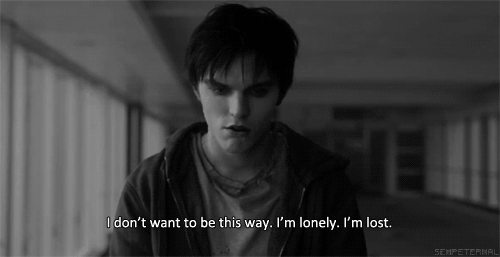
Not like a cool zombie
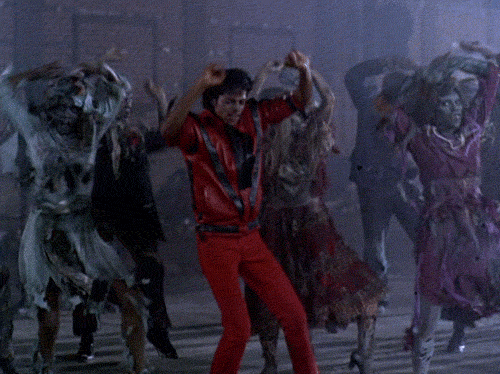
Geez... He makes it look so EASY and fun...
Now, you’re not gonna believe me, but I SWEAR I’m not complaining. Seriously. Just explaining where I’m at these days. Setting the stage, painting the backdrop, giving you some context. I REALLY do try not to complain because as I said, I know it could be way worse and I really am grateful for the good things I DO have and if this is the price for those things and people, I’ll do it again and again.
But do you see what I mean? Some might say, you don’t shower every day? You don’t brush your teeth regularly? But in my mind and body, I’m just too tired and don’t have time. Last year I broke two back molars in half chewing on gum. Yup, gum. And I lived with that for 6 months because I couldn’t get them fixed because I didn’t have insurance because I didn’t have a job. Seems like a legitimate reason versus a lame excuse.
But I know other people who are going to school full time, while working 2 jobs who seldom see their family let alone get time to play with them. Making do with less and seemingly more put-together than I am. So am I just making excuses then? I mean, have you SEEN this kid?!
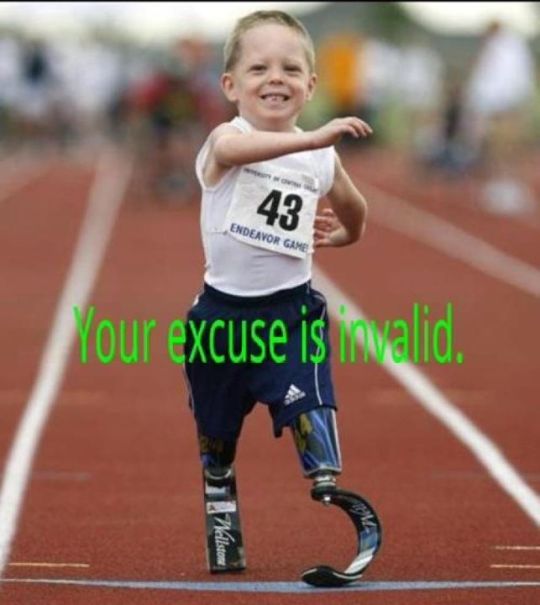
Now, I know I shouldn’t compare myself to others. I know everyone’s got their own challenges and I should only compare myself to the best version of myself. But that’s just the thing. I AM comparing myself to myself. And I’m not even CLOSE.
It’s not that I’m dissatisfied with life. It’s not that I just want more money (though that couldn’t hurt) or a bigger house or power or fame. I really only want enough to care for my family and some extra to help others out. It’s more of a discontent with who I am as a person. I’m not as nice as I’d like to be. I’m not as skilled as I’d like to be. I’m not as humble as I’d like to be. The list goes on... Literally. I have a list. A back log of ideas I want to try, things I want to learn, skills I want to have and put to use, people I want to help.
Basically, I have bad health, bad financial situation, no career, super awesome self esteem, fragile mental health, and not much of a social life.
Sooooo... So so SO!
I’m changing. This WAS me.
I’m on a journey to finally achieve everything I’ve been putting off and become the best version of me. And I hope you’ll join me on the trip because I hope to learn from all this and I hope that someone somewhere can learn something as well. Even if that’s what NOT to do (Hey man, if it helps SOMEbody, I consider it a success and worth any effort).
So, follow along. I’ll share what I can along the way. And make sure to let me know how I can help you achieve YOUR goals too! Until later!
0 notes
Text
I’ve been reading “Woman Who Run With the Wolves” off and on since like October. I was reading the stories in chronological order (like beginning of the book to the end) but then decided that wasn’t very beneficial and chose a story that spoke to me and what I’m going through at the moment intuitively. Chapter 9 which is titled Homing: Returning to Oneself. This chapter or myth is about a seal woman who’s pelt is stolen from her by a lonely man and is tricked into marrying and staying with the man for 3 years or something like that – the woman and man have a child during this duration but the woman during this time is also drying out (she is loosing her lust and joy and wildish nature for life). In the story the seal woman asks for her seal skin back after the time has ended with the lonely man – he doesn’t give it to her saying that she would leave him and their child to be motherless and exclaims that she is a selfish woman. I feel like this narrative happens a lot in romantic relationships with woman. So, many times we are the giver the ones who give up time, dreams, work, hobbies, energy to be there for our men or children. And when a woman asks for some time for herself she is put down or deemed selfish, ungrateful, unfit. As women we are nurturer but many forget that we too need care. This myth resonated with me because as a new mother there are often times where I am not putting enough into myself- I end up feeling drained and tired more than I am excited and replenished from life.
“Among ethnic groups throughout the world, including many in the circumpolar region of West Africa, it is said that humans are not truly animated until the soul gives birth to the spirit (or child), tenders and nurses it, filling it up with strength”.
I want to touch on this passage from the book for a moment as a single mother in the US and with hiphop culture it has been seen almost as bad to be a mother if you aren’t married. And the responsibilities of a mother raising her child doesn’t change whether she’s single or married. There is this whole “baby mama” culture meant to put woman down for simply doing what our bodies were made to do (if we choose). It bums me out that in other cultures pregnancy and motherhood is more important and revered than it is in America. In many ways this chapter of Returning Home- of Returning to the self – was exactly like motherhood. I came from womb from woman just like everyone else on this planet has – and to go through pregnancy – to motherhood. I have come full circle I have returned to myself to my ancestors to the primitive instinctual body that is my soul.
Like most woman my age and younger the relationship I have with my mother is complicated it is not by any means where it should be. I used to believe that it wasn’t my job to fix my relationship with my mother and lately when I think about it I just don’t know how. I went through pregnancy basically on my own. I went and got Medicaid because my parents kicked me off their insurance. I went through all the psychological highs and lows on my own. So, when I think of my relationship with my daughter that’s when I realized how deep these wounds are and how deep the wounds are from my childhood stemming from my mother and her mother and her mothers mother. Somewhere (probably all the way back to slavery) the lineage of mothers mothering their daughters (especially in the African American community) got fragmented where daughters are teaching mothers how to love how to see how to be open after learning this all on their own. No one taught me how to love; not how to love myself or to love others. It took me awhile to forgive my mother but I know she did the best at her 25 years of age with two kids and being in the navy.
In this chapter there are lot of passages about this fragmented relationship between the mother and her daughter and these stories these myths aren’t being passed down in cultures anymore – how this form of storytelling could help these relationships if they were being passed down the lineage. It is intuition that is missing in the woman in the mother daughter dynamic relationship. It is storytelling. It is this innate nature in us to nurture and give until we are used up and dry (like the seal woman) and needing to go back to the water to the sea to be refreshed. It is the relationship from mother to daughter from woman to woman , sister to sister, friend to friend that will help us all to realize and reach our fullness.
Now I am just going to type out a few passages and quotes from the chapter that resonated with me and I hope they resonate with you to:
“Every creature on Earth returns to home. It is ironic that we have made wildlife refuges for ibis, pelican, egret, wolf, crane, deer, mouse, moose, and bear, but not for ourselves in the places we live day after day. We understand that the loss of habitat is the most disastrous event that can occur to a free creature. We fervently point out how other creatures natural territories have become surrounded by cities, ranches, highways, noise, and other dissonance, as though we are not surrounded by the same, as though we are not affected also. We know that for creatures to live on, they must at least from time to time have a home place, a place where they both feel protected and free”.
” The health of the ego is often determined by how well one measures boundaries in the outer world, how strongly one’s identity is formed, how well one differentiates past, present, and future and how closely one’s perceptions coincide with consensual reality”.
“Do not fear “not knowing”.
“They know when they are overdue for home. Their bodies are in the here and now, but their minds are far, far away”.
“Where is home? is more complex ….but in some way it is an internal place somewhere in time rather than space, where a woman feels of one piece”.
“In order to converse with the wild feminine, a woman must temporarily leave the world and inhabit a state of aloneness in the oldest sense of the word. Long ago the word alone was treated as two words, all one, To be all one meant to be wholly one , to be in oneness, either essentially or temporarily. That is precisely the goal of solitude, to be all one”.
This book is simply amazing. Don’t read it cover to cover pick which stories resonate with you in the time that you need to read them and read them learn from them and pass them on.
Woman Who Run With Wolves : Chapter 9 I've been reading "Woman Who Run With the Wolves" off and on since like October. I was reading the stories in chronological order (like beginning of the book to the end) but then decided that wasn't very beneficial and chose a story that spoke to me and what I'm going through at the moment intuitively.
1 note
·
View note
Text
Socially Responsible Investing: Is It Also More Profitable?
Since the Dawn of Mustachianism in 2011, the same question has come up over and over again:
“MMM,
I see your point that index fund investing is the best option. But when you buy the index, you’re getting oil companies, factory farm slaughterhouses and a million other dirty stories.
How can I get the benefits of investing for early retirement without contributing to the decline of humanity?”
And in these nine years since then, the movement towards socially responsible investing has only grown. Public pension funds have started to “divest” from oil company stocks, and various social issues like human rights, child labor, climate change or corporate corruption have bubbled to the surface at different times.
And all of this has led to the exploding new field of Socially Responsible Investing (SRI), and a growing array of new ways to do it.
So it seems that this is not just a passing trend – people just might be starting to care a bit more. And since capitalism is just an expression of human behavior, the nature of capitalism itself may be starting to change.
This leads us naturally to the question:
What can I do with my money to help fix the world? And even better, is there a way I can make money in the process of fixing it?
The answer is a good, solid “Probably.”
As long as you don’t get too hung up on getting every last detail perfect, because just like real life, investing is a haphazard and approximate and unpredictable thing. But by understanding the big picture, you can make slightly better decisions on average, which lead to slightly better results. And slightly better results, stacked up consistently over time, can lead to a much better life, or even a much better world.
This is true in all of the main areas we care about – personal wealth, fitness and health, even relationships and happiness. And while your money and investments are certainly not the most important thing in life, they are still worthy of a bit of easy and effective optimization.
So anyway, the first thing to understand with SRI is, “what problem am I trying to solve?”
The answer is, “You are trying to make your investing (especially index fund investing) have a better impact on the world.”
On its own, index fund investing is ridiculously simple. You just get an account at any brokerage like Vanguard, Etrade, Schwab or whatever, and dump all your money into one exchange-traded fund: VTI.
When you do this, you are buying a stake in 3500 companies at once(!), which is both impressive and overwhelming. How do you even know what you are holding?
Well, this is all public information, and easily available with a quick Google search. For example, here’s a list of the top 90 holdings in VTI (click for larger):

Top 90 holdings in Vanguard’s VTI Exchange Traded Fund
As you can see, the biggest chunk of money is allocated to today’s tech darlings, because this index fund is weighted according to market value, and these are the most valuable companies in the US today.
Through a convenient coincidence, the total value of the VTI fund happens to be just under $1 trillion dollars, which means you can just throw a decimal point after the ten billions digit of market value to get a percentage. In other words, about 4.7% of your money will go towards Apple stock, 4.4 towards Microsoft, and so on. Together, these top 90 companies are worth more than the remaining 3,540 companies combined, so these are what really drive your retirement account.
And within this list, you will see some of the usual suspects: Exxon and Chevron (oil), Philip Morris (tobacco), Raytheon and Lockheed (bombs), and so on.
But what about the less-usual suspects? For example, I happen to think that sugar, and especially sugar-packed beverages like Coke, is the biggest killer in the developed world – a major contributor to 2 million of the 2.8 million deaths each year in the US alone. Should I exclude that from my portfolio too?
And what about drug and insurance companies – aren’t they behind the political stalemate and high costs of the US healthcare system? Comcast funded some election disinformation campaigns here in my home town in the early 2010s, should I exclude them too? And if you’re part of a religion that is against charging interest on loans, or in favor of pasta and Pirate costumes, or against a spherical Earth, or any number of additional ornate rules, you may have still more preferences.
The higher your desire for perfection, the more difficult this exercise will become. However, if you are like me and you just want to get most of the desired result with minimal effort, you might simply have a look at the Vanguard fund called ESGV.
ESG stands for “Environmental, Social and Governance”, and in practice it just means “We have tried to avoid some of the shittier companies according to some fairly simple rules.”
And the result is this:

Vanguard’s ESGV Exchange traded fund (ETF) – top 90 holdings
The first thing you’ll notice is that it’s almost the same. In fact, the top five holdings – Apple, Microsoft, Amazon, Facebook, Alphabet (Google), collectively referred to as the FAANG stocks – are completely unchanged – and this means that there will be plenty of correlation between these funds.
It’s also the reason that the stock market as a whole has recovered so quickly from this COVID-era recession: small businesses like restaurants and hair salons have been destroyed by the shutdowns, but big companies that benefit from people staying at home and using computers and phones are making more money than ever. The stock market isn’t the whole economy, it’s just the publicly traded companies, which are the big ones.
But let’s look at the biggest differences between the normal index fund versus the social version.
The following large companies listed on the left are missing in the ESGV fund, in order of size. And to make up the difference, the stake in the companies on the right have been boosted up to take their place in your portfolio.

Main differences between VTI and ESGV (source: etfrc)
The omission of Berkshire Hathaway was a bit of a shocker, as it is run with solid ethical principles by Warren Buffet, one of the worlds most generous philanthropists. And in fact the modern day nerd-saint Bill Gates is on the Berkshire board of directors, another person whose work I follow and respect greatly.
(side note: Apparently the company fails on the “independent governance” category. And Buffet disputes this category, but in his characteristic way has decided to say, “Fuck it, I’ma just keep doing my own thing with my half-trillion dollar empire over here and you can have fun with your little committee” – I’m paraphrasing a bit but he totally did say that.)
Furthermore, both funds hold the factory meat king Tyson foods, while neither holds Roundup-happy Monsanto, because it was bought by the German conglomerate Bayer AG a while back. Nextera is a giant electric utility in the Southeastern US that claims to be the world’s largest generator of renewable energy. Some do-gooders are against nuclear power, while others (including me) think it’s the Bee’s Knees and we should keep advancing it. And all this just goes to show how nobody will agree 100% on what makes a good socially responsible fund.
But What About The Performance?
In the past, some investors were nervous about giving up oil companies in their portfolio, because while it was a dirty substance, it was also what made the world go round – which meant it was a cash cow.
Now, however, oil is on its way out as renewable energy and battery storage have crossed the cost parity threshold – meaning it’s cheaper to make power (and vehicles) that don’t use oil. In its place, technology is the new cash cow, and tech is heavily represented in the ESG funds. The result:

Traditional index fund (VTI) vs Socially Responsible equivalent (ESGV)
As you can see, the performance has been similar but the ESG fund has done significantly better in the (admittedly short) time since it was introduced at Vanguard.
Of course, we have no idea if this will continue, but the point is that at least our thesis is not a ridiculous one – environmentally sustainable companies do have an advantage, if the world gradually starts to care more about these things. And if you look at the share price of Tesla and other companies that surround it in electric transportation and energy storage, you will see that there are many trillions of dollars already lining up to benefit from this transition. And the very presence of so much investment money creates a self-fulfilling prophecy, as Tesla is now building or expanding five of the world’s largest factories on three continents simultaneously.
So What Should You Do? (and what I do myself)
My latest home-brewed ebike project – this one can reach 42MPH / 67km/hr!
First of all, it helps to remember a fundamental piece of economics: your spending dollars will probably have a much bigger impact than your investment dollars. This is because you are sending a direct message to the world rather than an indirect one:
When you buy a new gasoline-powered Subaru (or a tank of gas for your existing guzzler) or a steak at the grocery store, or a plane ticket, you are telling those company directly that consumers want more of these products, so they will produce more of them immediately.
When you buy shares in Exxon, you are only subtly raising the demand for those shares, which raises the average price, making it ever-so-slightly easier for Exxon to maybe issue more shares in the future. In other words, you are making it easier for them to access capital. But capital is only useful if there is demand for their products. And with oil there is a nearly constant surplus, which is why OPEC and other cartels need to work together to artificially restrict supply, just to keep prices up.
Plus, as a shareholder you are theoretically eligible to place votes and influence the future direction of companies – even companies that you don’t like. If you look up the field of “shareholder activism”, you’ll see this is a tradition that goes way back.
So I have tried to take a few simple steps on the consumer side myself, and I find it quite satisfying: Insulating the shit out of all of my properties, building a DIY solar electric array on one of them, and buying one electric car so far to eliminate local gas burning. And a few electric bikes including a super fast one I made myself.
Each one of these steps has provided a very high economic return, percentage-wise, but that still leaves a lot of money to account for, which brings us back to stock investing.
As someone who loves simplicity, I have done this:
Bought almost entirely VTI (or similar Vanguard funds) from 2000-2015
Started experimenting with Betterment in 2015, liked it, and have been adding a percentage of my ongoing savings to that account to that since then. (Note that Betterment now also offers a socially responsible portfolio option.)
Switched the dividend re-investing of my old Vanguard VTI over to Vanguard ESGV, to avoid “wash sales” in making the most of Betterment’s tax loss harvesting feature.
Bought some shares of Berkshire Hathaway separately, and also make a few sentimental investments in local businesses, including the MMM HQ Coworking space.
But you could choose to be more hardcore in your ESG/SRI investing:
Buy your own basket of stocks based on the index, but with different weighting based on your own values
Spend more money on other things that generate or save money (a bigger solar array on your house, better insulation, electric car, an ebike to reduce car trips, etc.)
Invest in local businesses of your choice, rental real estate, community solar projects, or other things which generate passive income – publicly traded stocks are just one of many ways to fund an early retirement!
Like most areas of life, investing is not something you have to do perfectly in order to succeed – even socially responsible investing. If you apply the 80/20 rule to get the big picture right, you have probably found the Sweet Spot and you can move on to the next area of life to optimize.
In the Comments:
What is your own investment strategy? Have you thought at all about this ESG / SRI stuff? Did this article bring anything new to the table?
from Finance https://www.mrmoneymustache.com/2020/08/22/socially-responsible-investing/
via http://www.rssmix.com/
0 notes
Photo

My Dad and the American Social Contract I'm going to talk about some extremely painful personal history to explain what I believe has gone terribly wrong in America's view of worker's rights, health care, the myth of heroic individualism, and the death of the modern industrial social contract. In 1964, when I was twelve years old, my dad, who was forty-two, slowly became seriously ill. It started with numbness in his toes. Doctors ruled out diabetes, and a podiatrist treated him for small lesions that began appearing between his toes. Eventually he developed gangrene in his right big toe. Surgeons removed first his toe, then all his toes, and finally, his leg up to his knee. He was diagnosed with Buerger's Disease (look it up), an inflammatory vascular disease that has no known cure and is strongly associated with heavy tobacco use. (One of the reasons I've never been a smoker or had any interest in protecting "smoker's rights.") When all of this came to a head, before my dad entered the hospital for the first of what would be many many many visits, he told me he'd been given a prognosis of death within five years. He wanted me to know so that I'd be prepared, since it could happen at any time. I was thirteen. Because our family had only basic employer health care coverage, the expense of a private hospital became too much for us, especially the expense that would accrue while my dad recovered from the amputation, along with the cost of an artificial limb. Fortunately my father was a World War II vet; through the efforts of my mother, also a vet, and the political push from our local American Legion post, and my uncle making a pretty wild scene at the Fort Hamilton VA Hospital, Dad was taken into the Veterans Administration health care system -- which, in 1965, even before the rapid expansion of the Vietnam War, was a system that moved glacially to provide care with overburdened resources. Nonetheless, because Medicare and Medicaid hadn't been passed yet, the VA was the only government funded health care available, and despite their frustration with the system, my parents were desperately grateful to have access to it. My dad spent six months in the VA hospital that first time, waiting for a prosthetic leg to be built and fitted and for the physical therapy required for him to use it. We visited him as often as we could, which wasn't often, because we lived in northern Queens and the Fort Hamilton VA Hospital was at the south end of Brooklyn, one bus, and two subway lines away-- an hour and a half each way. My mother had never learned to drive and in any case we didn't own a car. A side note: Until I was in my mid-30s I had no conscious memory of actually visiting my dad in the VA hospital during his several stays there from the time I was thirteen until my late teens. I knew I'd visited him, but I'd blanked out the actual experience. It never occurred to me to ask why. It was only when I saw the Oliver Stone film "Born on the Fourth of July" that I realized why I'd wiped the memory of those visits from my mind. My dad was in the Fort Hamilton VA Hospital Amputation Ward, off and on, from 1965 to 1970. (A year or two after losing his right leg, he returned to have his left leg amputated and replaced with a prosthetic, and later was hospitalized for arterial transplant surgery when vascular inflammation threatened his arms. I'm vague on the timeline for the same reason I'm blank on the visits.) This period coincided with the escalation of the war in Vietnam, and as "Born" drove home, Fort Hamilton was one of the primary VA hospitals devoted to the care of soldiers who'd lost limbs in the war. Many if not all of those soldiers were young men only a few years older than I was at the time. (The average age of the soldiers who served in Vietnam was nineteen.) Every time I visited my dad in the amputation ward I was surrounded by limbless young men who were barely old enough to be my big brothers. It's not surprising to me that given the double trauma of what was happening to my father and what I saw around him, happening to young men who could have been me, that I successfully blocked those memories for almost twenty years. I've gone into great detail explaining these events because I want to impress upon you the utterly desperate situation my family was in after my father became ill. I want you to understand, just from a medical care point of view, how bleak things were. If it hadn't been for the VA medical system my father would, at best, have been left one-legged and unemployed; we would have been destitute; and I probably wouldn't have gone on to write the death of Gwen Stacy and create the Punisher and half the line-up of the CW's Legends of Tomorrow. In a sense, I owe my creative life to government health care -- and in a very real way, my father owed his personal survival and his ability to return to work and provide for his family to that system, however flawed and imperfect. Private health care insurance didn't save us. Government health care did. (Not to keep you in suspense: my father did not, in fact, die within five years of receiving his diagnosis. Through a combination of medical care, advances in pharmacology, and sheer strength of will, Dad lived thirty years with Buerger's disease, going in and out of hospitals many many times, surviving multiple heart attacks, and kicking ass till he was in his seventies. Not once, in three decades, did I hear him complain or express any self-pity. I've often wished I could live up to the example he set for me, but I'm not the man my father was.) But there's another aspect to this story that I believe is extremely relevant to the crisis Americans face today, and it doesn't involve government or health care. It concerns the nature of the worker in society and the social compact of the post-WW II industrial economy. Fortunately it also has a personal narrative. At the time my dad became ill he was an account foreman at a mid-sized printing house in Manhattan that provided printing and mailing services to book publishers and direct-mail advertising firms. Dad began working for the company as a truck driver in the mid-1950s, and within ten years he was promoted to a managerial position, one of three men overseeing the operation. He was a blue collar man, earning enough to buy a house in the suburbs (thanks to a government-underwritten VA mortgage, part of the G.I. Bill), support a stay-at-home mother, and a paid Catholic school education for both his kids. He had the kind of job that barely exists anymore, and he worked for the sort of company that's been driven out of business by the rise of a philosophy of management that puts the ruthless pursuit of profit over corporate responsibility to workers as the highest goal of business. The company Dad worked for was family owned and run. For good (and, as we'll see, for ill), the owners treated their workers as extensions of their own family. They were protective of their workers, and loyal. They expected and received loyalty in return. When Dad became ill and unable to work, the company held his job for him and continued to pay half of his salary for six months until he was released from the VA with an artificial leg and returned to work. When he became ill a year or two later, had his remaining leg amputated, and spent almost eight months in rehabilitation, they did so again. Dad continued to work for them, buying a car and learning to drive with hand controls when the subway ride from Queens to lower Manhattan because impossible after the loss of both legs, until the early 1970s. His company consistently accommodated him, supported him when he needed help, and respected his contribution to their success -- enabling him to continue to respect himself as a worker and as a man. I won't pretend his employers were paragons of worker's rights, however. One of the side effects of their treatment of employees as family, of offering loyalty and expecting loyalty in return, was an unrelenting hostility to any hint of unionization. As a printing shop with a trucking operation they were a target for unionization by two powerful New York unions -- the Printers Union and the Teamsters. Dad's employers ruthlessly fought both, firing anyone who attempted to organize employees for either union. Like I said, the company's owners were not paragons. It's the flip side of their paternalistic attitude toward the people who worked for them. Even so, I'd argue that employer paternalism in the 1950s and '60s was a better response to the social compact of the modern industrial era than the complete disregard for the employer/employee relationship that supplanted it in the 1980s. The breakdown of that social compact, between those who make money from the labor of others, and those who provide that labor, is at the root of the crisis we face today as a nation. It's also the reason for the breakdown in support for the kind of government action that saved my family. World War II and the two decades that followed created a sense in Americans that we were all part of a common American destiny. The country fought the war together -- everyone "did their part" -- and together we reaped the benefits of a postwar economic boom, exemplified by the social compact between worker and employer. It would be a mistake to over-idealize this unspoken but clearly understood compact. It was often abused (as it was by my dad's company when the owners fired unionizers). But, however imperfectly, this social compact, this sense that every American shared a destiny with every other American, managed to create the largest and wealthiest middle class in world history. Unfortunately, when history demanded that the benefits of the American social compact be extended to embrace everyone in America and not just white people, America decided it was time to break the compact and establish a new order: The Myth of the Individual Hero. Once African Americans demanded to participate fully in the social compact, white Americans decided the compact didn't exist. Rather than share the benefits, white Americans insisted there was no social compact and never had been, for anyone -- that Individualism was the Real American Way. Ignoring the realities of their own lives, middle class and blue collar Americans turned against the vision of the American Dream as a shared destiny. This happened in my own home and was the source of deep conflict between me and my father over political issues toward the end of his life. My father, who literally owed everything -- his life, his home, his son and daughter's education and his wife's ability to be a stay-at-home mom -- to the post war social compact of shared responsibility among employers and employees and government as a mutually reinforcing support, came to believe that society ran best when every man was solely responsible for himself. He convinced himself he owed nothing to anyone. He convinced himself government programs to aid people in need were nothing more than an encouragement to freeload-- despite the fact that since the mid-1970s he'd been supported by Social Security Disability and my mom's VA pension. He became the living embodiment of the rejection of the New Deal and Fair Deal that made his life and the lives of his children possible. He wasn't alone, sadly, and today we are all reaping the bitter fruit of that betrayal of the social compact that once truly did Make America Great. Like I said at the outset, this is a deeply personal, deeply painful personal history, not least because my father missed the point of his own heroic story. He was an amazing man, a fighter who struggled and triumphed against impossible odds -- but he didn't do it alone. He had help. The fact he had help doesn't diminish him in my eyes. The fact he ultimately refused to recognize the debt he owed to others -- that we all owe to each other -- does. I love my father and honor his memory, but his legacy saddens me. We are none of us entirely self made men or women. We need each other. When we lost that sense of shared destiny we lost a vital part of what made us a great country of remarkable men and women. Continuing to reject our shared destiny will only continue to ensure that our future will not be brighter than our past.
50 notes
·
View notes